#but also it’s such a fun lens for character analysis
Explore tagged Tumblr posts
Text
u guys don’t even Know about the mp100 pokémon au being cooked in discord dms rn. you’ve got no fucking clue
#mp100#mp100 pokemon au#am i going to properly Do Anything with this concept other than develop and rotate it? probably not#but also it’s such a fun lens for character analysis#like. shou’s team is built only out of pokemon ash ketchum has used before#or ritsu’s team being nearly all non psychic types
16 notes
·
View notes
Text
my favourite writing device is having an un-Rei-liable narrator
#rei#volo#cheren#// tikposting#// character meta#the crowd booes me off the stage#forgive the pun XDDD his name is too easy to pun on#the way i write it it's not a conscious choice. it's just how the pov character (rei) experiences and contextualises the world#revealing backstory and personality and mindset through narration !!!!#not necessarily out of malice it's just. how he views things#interpreting new and foreign experiences through the lens of what came before...#conversations which read differently to different people.#in the context of rei that's stuff like unease around authority figures#always choosing his words carefully to project an image of competence (he has to be needed)#distrust and not taking things at face value but also paradoxically a fragile and nurtured sense of almost blind optimism#when it comes to friendships. like volo. (everyone turned on me when the sky turned red but it all resolved itself in the end didn't it?)#(what makes this different? / a lot of things. / i choose to believe)#volo [directly]: “i won't be stopped from my goal” rei thoughts: we can work with this!!!!#and everything with Arceus too and his divine blessings and a plan that will work out in the end#if Rei can just... figure out what part he's meant to play. interpreting events as a narrative hurtling towards some unknown conclusion#i am talking about rei here specifically but this writing device is so good in general#would be fun to try get inside volo's head. there's so much going on there i don't understand yet#quite fond of that one analysis post about how volo lacks emotional intelligence and sees relationships as transactions#not necessarily out of malice it's just how he views things. whether because of past experience or brain chemistry#also need to give a shout to cheren my guy who is an outsider pov who projects his own experiences onto new things so that he Understands#(an outsider to Hilbert and N's clash of truth and ideals. life changing experience and knowledge but felt just a little off to the left)#(the narrative repeated again with new heroes. all he can do is help them but it falls on their shoulders in the end)#(no wonder he tries to insert himself into Situations)#anyway tag ramble over feel free to also ramble to me about your takes XD#rei pokemon
27 notes
·
View notes
Text
it's incredibly apt to me that the spiderverse team specifically drew upon brutalism as the primary style for the architecture of spider society because it's a style simultaneously linked to this notion of raw honesty (because you expose the material laying at the core of the structure) + social wellfare (as concrete was relatively cheaper to use and thus you got a lot of cheaper housing utilising this style), egalitarian by nature - it all looks the same, function over form etc.
but it ended up also getting associated with the structural flaws present in social wellfare systems by virtue of where it was applied as well as it being a style that's quite intense by nature (some would even argue ugly fjdfjk), and thus you get people implicitly associating it with those structural flaws and thinking of it as oppressive, even though the movement wasn't like. intentionally trying to cultivate that impression or be utilised in such a way.
which is interesting to me because that kind of duality works perfectly with the kind of tonal shift miles goes through when operating in that environment. spider society is at first wonderous and bright and brilliant, evocative of endless possibilties and stylistically almost like a large concrete web. but when miles is failed by that system, the large concrete web becomes constraining and suffocating.
hell, the idealogical roots of brutalism even work to an extent with the idealogical roots of spider society. neither was cultivated with the active intent to cause harm, and they're both associated with the desire to promote a future that is providing for the people utilsing it, but ultimately it's a tool. and any tool can be one that, inadvertently or otherwise, causes harm.
#the analogy and connections im drawing OF COURSE only extends so far as spider society is moreeee. an anaolgy#for the harm that's perpetuated if you subscribe to belief systems that exclude anomalous traits/experiences#<- and even THAT becomes messy because the very nature of the stakes naturalises that belief system as having legit concerns#but that analogy is also secondary in the story's priorities to providing a lens for the characters to be able to interact w the#suffering in their lives and qustion what purpose it holds - if any#so miles shocking miguel is tonally a celebration of the idea that you should leave systems that fail to support you in the way they should#but it's tonally an endorsement of miles having hope where miguel has succumbed to despair#spiderverse is very fond of using emotional shorthand (this isnt a criticism - its just acknowledgement of what its doing) and i think esp#in a film designed to be understood by teenagers/older kids and w a strict runtime this kind of technique is effective#even if it inherently has some drawbacks (naturalisation of the stakes if youre not careful about how you write the solution to those stake#its trying to say a lot with a broad emotional sweep and thats hard and shit can get lost in the water or implications not accounted for#but hey thats the fun of critical analysis#tunes talks spiderverse#long post
16 notes
·
View notes
Text
reblogging this since its homestuck day. here's an excerpt!
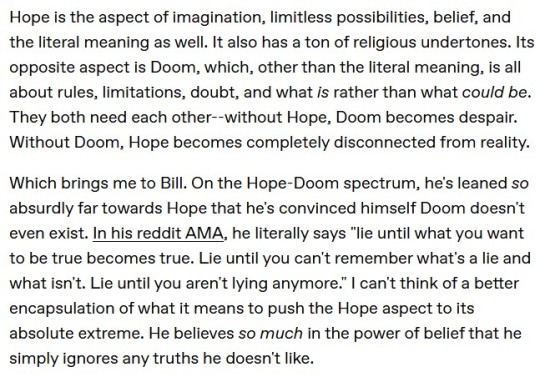
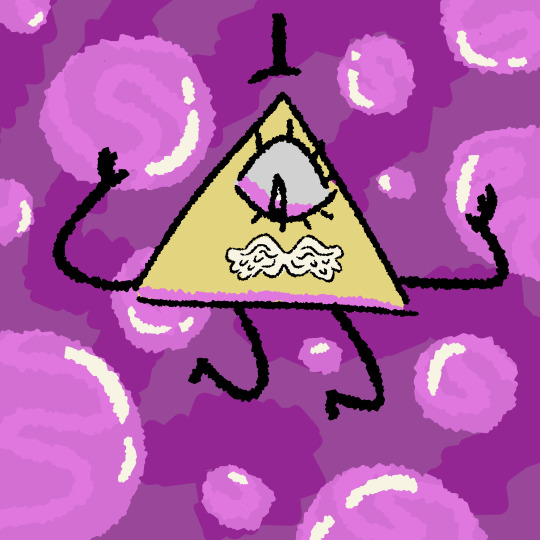
Bill Cipher: Lord of Hope (the homestuck classpect)
explanation for why I picked this classpect for him under the cut
First of all: I think classpect is heavily influenced by one's narrative role in a story. It's influenced by personality too, of course, but someone with the exact same personality could have a completely different classpect depending on how the story uses them.
Lord is an extremely powerful class reserved for the big-bad in homestuck. It means having unimaginable amounts of control over your aspect (which here is Hope). It's also a volatile, destructive, and self-serving class. It's also the mirror and opposite of the Muse class, which is equally powerful, but wielded passively for the benefit of others, often using methods more like setting up all the components of a rube goldberg machine behind the scenes, rather than the Lord's preferred method of steamrolling over things whenever possible.
Second side-note: Each aspect has an opposite, and I think these aspect pairs meaningfully influence each other by virtue of being on opposite ends of a continuum. You might even say they're opposite sides of the same concept.
Hope is the aspect of imagination, limitless possibilities, belief, and the literal meaning as well. It also has a ton of religious undertones. Its opposite aspect is Doom, which, other than the literal meaning, is all about rules, limitations, doubt, and what is rather than what could be. They both need each other--without Hope, Doom becomes despair. Without Doom, Hope becomes completely disconnected from reality.
Which brings me to Bill. On the Hope-Doom spectrum, he's leaned so absurdly far towards Hope that he's convinced himself Doom doesn't even exist. In his reddit AMA, he literally says "lie until what you want to be true becomes true. Lie until you can't remember what's a lie and what isn't. Lie until you aren't lying anymore." I can't think of a better encapsulation of what it means to push the Hope aspect to its absolute extreme. He believes so much in the power of belief that he simply ignores any truths he doesn't like.
He embodies the Hope aspect in many other ways, too. Originally he was going to be more of a morally-neutral trickster character, whose whole purpose was just to show up randomly in Dipper's dreams and rattle off wild statements of questionable truth and conspiracy theories at him. The kind of things that people hope are true (sometimes to make the world seem more exciting and magical, sometimes for bigoted reasons, you know how it is with conspiracy theories), but the point is: Bill retains some of this in his canon personality. He tells Ford in the journal that the moon landing was fake. When he first meets Gideon, he says the whole "reality is an illusion" thing. He delights in sharing these kinds of things with people, and yeah, it's to fuck with them, but there's still something to be said about the fact that he accomplishes this through the use of things that exist as uncertain possibilities in people's minds, and things that some people have a strong belief in and/or hope to find proof of. He's wielding Hope as a tool, because that's when he's in his element.
Bill also preys on people's hopes and dreams, appearing to people literally inside their heads, and existing mainly in dreams and minds for billions of years--a place where you really can create anything you can imagine. He uses Ford's hopes of accomplishing something meaningful to get him to create a doomsday device. He also has Ford practically worshiping him, calling him a Muse with a capital M, calling his presence 'divine intervention'... the religious themes that often go hand-in-hand with the Hope aspect are definitely present. Of course a Lord would wield the Hope aspect to give himself worshipers who practically see him as a god.
And, speaking of doomsday devices, Weirdmageddon is the exactly what would happen in a world where the Hope aspect ran rampant without any laws or restrictions or concrete truths. In the codes of Journal 3, Bill says, "why should time only move forward, why must cause precede effect, who voted on the laws of physics - rules are perversions against all will, that's why I'm about to rewrite the whole system buddy, and no one is going to stop me."
We also get some insight into Bill's beliefs when we take a look as Mabel's dreambubble. He literally uses someone's hopes as a weapon against them, trapping her inside a twisted version of all the things that could've been true, if only the world was fueled by pure imagination, without any laws of physics or imperfect days or boring moments. Bill is so confident that this trap is infallible that he doesn't even bother to stop Dipper from trying to get her out once he makes it inside the dreambubble. Maybe the reason why Bill is so confident that this trap is inescapable is because he's pretty much trapped himself in a dreambubble of his own creation, where anything is possible and fantasy wins over reality every time (talking about the nightmare realm here), and was so intoxicated by the limitless lawlessness of the place that he spent billions of years trying to expand his little self-imposed prison to cover the rest of the multiverse, rather than ever stop to question himself or consider the consequences. Because with enough Hope, there are no consequences, only infinite possibilities limited only by your own imagination! ...right?
I could probably go on, but I think this is more than enough to support my case for Bill being a Lord of Hope. I'm always interested to hear about other classpect headcanons though!
#one of my favorite bill analyses that I've done and yet the cross section of present day bill fans and people who have read homestuck is low#I do try to make the explanation understandable even without knowledge of homestuck though#classpects are just a fun lens to do character analysis through#in homestuck its kinda like a combination of rpg class + the basic-force-of-the-universe that you control#and its assigned to characters who enter a... cosmic video game I guess you could call it#fun fact my aspect would also be 'hope'#although its hard to choose a class. considering I believe it depends on the narrative role thats played in a story#for a real person you could probably argue that we are all every class because we play different roles in various people's lives#the fun thing about basing class on the story is that you can pick multiple classes for the same character in different AUs and stuff
49 notes
·
View notes
Text
Started thinking about Riku-Kairi parallels and symbolism wrt the ending of kh2 so please hold while i get needlessly verbose about it-
specifically it started with this gif

and ofc adhd is as adhd does and started going down the rabbit hole of connecting the dots.
The act of reaching out a hand/hand holding is a recurring thing in kh, the vast majority of which is chock full of meaning and symbolism, and this is no exception. This is the culmination of The Hero's Journey part of Sora's tale, the return home, and the heartfelt reunion between long-seperated friends. fun fact the heroine's journey follows the hero's journey for the first third or so before continuing on. kinda like how kh continued on long after things seemed to be 'resolved'. weekly plug to look up Howler's Heroine's Journey essays if you haven't yet
The angle from which I am viewing this scene right now is in regards to ofc Riku, and his own iconic pose that we see the first time in the intro to kh1 (and many, many times since)

And this is where my riku-kairi-are-inverted-parallels-to-each-other brain starts barking like a dog because oughghghghggh same pose opposite side completely different body language- AHG.
And this matches their character arcs (as well as their respective combined arcs with sora) to a T as well. Riku's pose is the first we see, way back in kh1, and his hand is as much a taunt as it is an offer. Very befitting his relationship to sora in that game, which was coloured by a forged rivalry and intense jealousy (to quote the ultimania; Complicated Feelings) of/for sora.
(it is also notable that to date this gesture has yet to be resolved. the closest they've gotten is when sora grasped Riku's hand in kh2 on finding him- albeit in Ansem's visage.
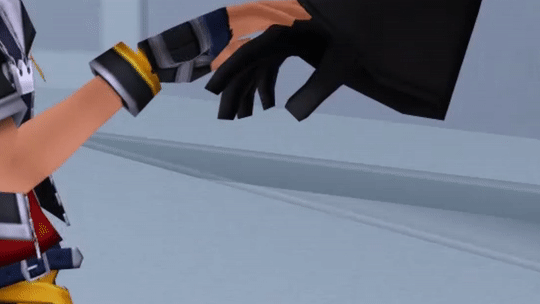
Symbolically this is Sora attempting to accept the gesture, but this time it is Riku who fails to meet him halfway, too deep in guilt and regret to feel worthy of it. his hand is turned downwards, limp and unresisting.
And again in DDD when Riku grabs sora's hand/wrist in an attempt to wake him from his nightmares, but this time sora isn't capable of reciprocating. like two ships passing in the night, always reaching but never quite meeting)
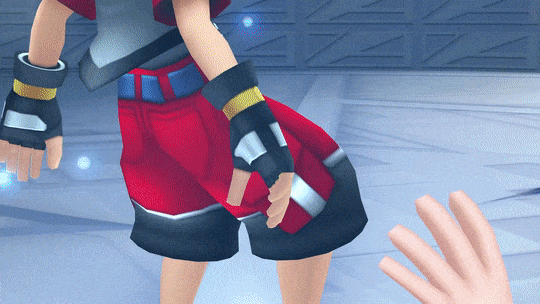
(this one isn't quite as strong in the visual symbolism specific to the Riku Pose, but i did think it bore mentioning)
to return to the first gif however, for Kairi her posture is much less stiff, leaning forward with palpable releif at Sora's return. Honestly the fact that she holds out her left hand (which as far as i know is not her dominant hand) marks this as a very deliberate choice to parallel her as opposite to riku. and much like the rest of kh2's ending, it FEELS like a culmination, a completion of their arcs.... and most certainly isnt.
Which i mean to say, it's a mid-point. And the reason I say this is because of one little thing.
The seashell charm.

There's a sort of irony here in that the charm that was meant to reunite them in this moment is also symbolically like a wedge between them. A heartfelt and meaningful gesture, don't get me wrong! i love this scene and the genuine emotions within, but i do love chewing on the way this gains a slightly different meaning in the greater context of later story beats; specifically that of kh3.
With how pointed and direct the parallel is between kairi and riku in these scenes, it did make me pause for a moment thinking about kh3. i know we've all seen a thousand and one analysis' of the paopu scene at this point, but forgive me as i must do so again under this specific lens.
'how does the paopu scene relate to the hand extended gesture at all?' i hear you ask, and on the visual surface not much. it has more to do with sora and kairi's relationship arc through the games and, of course, the lingering loose thread that was the cave drawing.
The paopu scene is a touching recreation of that cave drawing, one enacted by a pair of kids who didn't know if they would live to see another sunset. It's also probably the most symbollically dense thing in all of kh and that is saying something so I'm going to try and keep my observations limited to just what is relevant to this post- and that would be the way that the paopu scene is a direct continuation of Kairi's 'you're home' gesture in kh2.
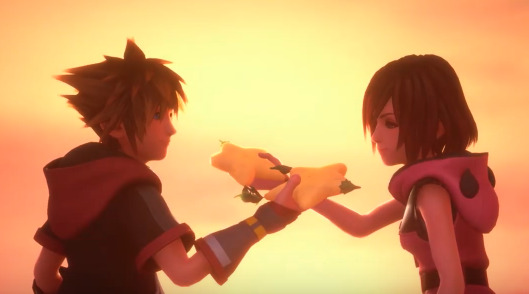
shooting stars are also a common recurring symbol in kh, and that's the symbol that ties these two scene's together. if kh1 is two disparate stars each trying to reach the other (the cave drawing, the seashell charm, the way their hands are seperated at the end of kh1), and the end of kh2 is that of the stars finally meeting (the single seashell star charm pressed between their palms), then the paopu scene is that of the stars passing each other by and beginning their own journey's anew (two stars held by crossed arms, each now holding a small piece of the other (bitten fruit) to show that their meeting may have been brief but it was meaningful)
it is in this way that kh3 quietly and tenderly closes out sora and kairi's combined arc, as two unlikely friends who then drift apart again, shining brightly for the shared experiance, Remind mostly serves to support that finality, tying up the last couple loose ends between them, and leaving the two far more comfortable with each other than they ever were while that arc was still ongoing (which i read as them no longer being uncertain as to what their relationship is; that of friends, and not whatever so many others around them had pushed and assumed)
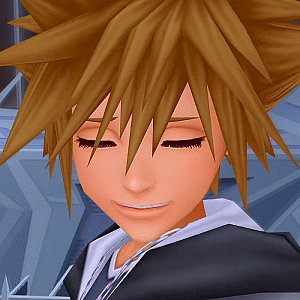
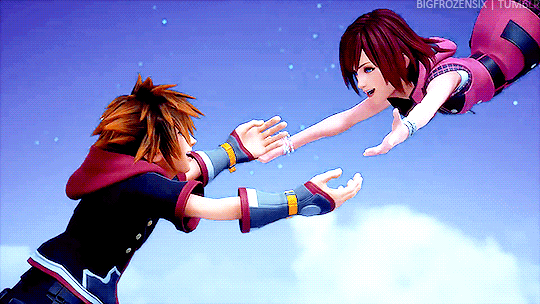
(seriously look at how much more comfortable they are with each other the second the pressure to be something they're not is off. the awkwardness is completely gone i love it)
All of this is ofc still in parallel to Riku, who boasts no such star imagery (instead he has the iconic Heart of KH itself), and in fact while he symbollically continues to reach out to sora, physically he has completely refrained from doing so at all- in fact most examples of the Gesture in kh are deliberately invoked by other characters in order to bring riku to mind in some way (and often more for the players benifit than sora's)
axel in CoM,
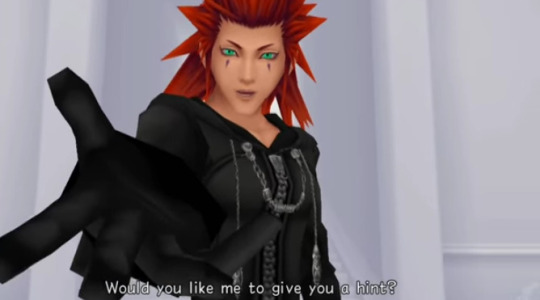
(i have given up on tumblr gif search)
YMX in DDD,
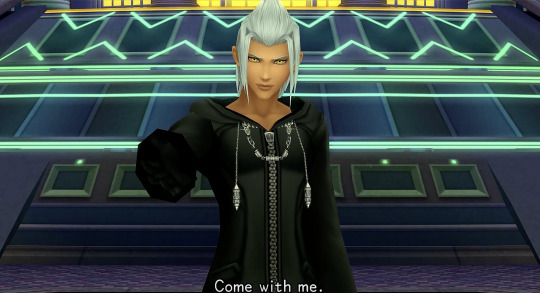
which then immidiately cuts to riku in kh1 just to make it as blatant as possible that yes the reference is intentional (i guess CoM was too subtle somehow so they had to make sure this time)
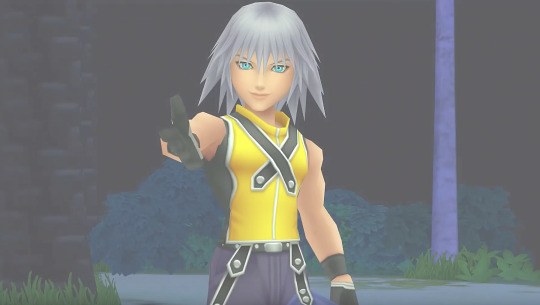
and even Riku himself to Namine at the end of kh3, representing Repliku's final wishes in a funny sort of symbolism oroboros.)
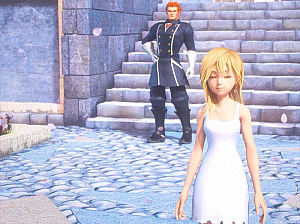
and it's not a coincidence that the completion of that connection provides definitive closure to the arcs in question; that of namine to repliku, but also a little bit to riku himself. namine still has a role to play, but that role (i think) is more or less exclusive to her relationship with sora. namine and riku's relationship arc, background as it is, is complete, and now both are connected primarily through their incomplete arcs with sora.
(which makes the way that sora and kairi's example in kh2 is a complete outlier really interesting tbh. smth smth thinking your relationship is one thing and if it was that thing then yes that would have been the end, but it wasn't that thing and thus it wasn't the end smth smth comphet metaphor smth)
which brings us back to how riku himself hasn't really reached out to sora directly since kh1, the act that set off both of their journey's. The reasons for that are many- guilt, fear, a certainty that sora will not reach back and that he doesn't deserve it anyway- but despite that the Gesture is still subtly affirmed as being Riku's over and over again, never quite letting the audience forget it... because eventually this bit of symbolism so consistently portrayed throughout the series will reach its own conclusion, starting how it began with one deuteragonist reaching out to the other, and this time the other reaching back to complete the gesture.
#i'm sure there's more layers here but i have successfully excised the hyperfixation brainworms so goodnight#and yes this is all written with full soriku endgame actually bias i freely admit#idk man i love the way kh uses symbolism#kingdom hearts#stop talking to yourself flight#flight's making things again#meta#soriku#long post
189 notes
·
View notes
Text
Turning Off Your Brain and the Critical Lens
Alright, let's start with this: there is a thing called a critical lens. It is a way of looking at a piece of art, examining what it's saying to us about itself or its subject or themes or whatever.
There are many critical lenses. Because this is something that's mostly only taught at the college level, most of them are (in my opinion) mired in academic language and not actually all that interesting in and of themselves: I think if you read a dozen stories through a feminist lens, you really start to think "okay, yeah, I get it". Different readings of different texts through different lenses can be great fun though, and it's one of my favorite parts of media criticism, and something that I wish people were more explicit about.
I'm going to talk about the Barbie movie, because it's easy. The feminist lens is obvious and in my opinion intended: it's the thing that the movie is most trying to be about, and as a consequence, it's something that probably has the most critical meat. But you can also read the movie through other lenses, and ask what it has to say about capitalism, about race, about neurodivergence and queer theory and game theory and a bunch of other things.
Some of these readings are Unintended. The author (in this case, hundreds of people working together on the film) did not intend for you to look at the movie to see what it's saying about, say, American Imperialism. Probably.
I personally enjoy unintended readings. I like teasing apart a book to see what it's saying about different things, and how it's saying it, and what the assumptions it's operating under, and whether this creates anything interesting when I bring a different set of assumptions. I think the writers and actors of Winter Soldier were not trying to say anything in particular about masculinity, but fuck it, let's watch the movie and think about it.
Sometimes people will watch something and recommend that you turn your brain off. Sometimes they'll say this to you just as you're about to start in on some critical analysis of something that definitely was not made with that critical analysis in mind.
Here's how I think of "turning off your brain": it's a critical lens. It's not a critical lens in the sense that academics might use it, but you're looking at this piece of media from a specific viewpoint, and that viewpoint is "omg they're in love" or "fuck yeah" or "no, don't go into the basement!". There are certain pop genres that greatly benefit from being viewed this way, at least in terms of pure enjoyment.
When I sit down to watch a romcom, I can do it with male/female social dynamics in mind, or I can do it with "aw, I hope these kids get together" in mind. One is the intended reading, and I don't think that it should get all that much privilege for it, but I do think generally it can result in better enjoyment. I love media criticism and consider it to be one of my main hobbies, but if you fall in love with one particular way of viewing media and only use that single one, you're going to have a bad time.
I write and generally enjoy rational fiction, which comes with its own lens, which I guess we can call the rational lens. If you sit and view a work through the rational lens, sometimes you can have fun with it: you try to work through the systems as presented and the actions of the characters and think about how you could make everything make sense. The way to do this that's not very fun is to look at a work through the rational lens and conclude that the author is dumb, the characters are dumb, and the worldbuilding is shit. I guess this can be fun if you have a sense of smug superiority, but I personally do not.
One of the things that I love about media criticism is that you can sometimes extract weird and new things out of a work. One of the things that I love about fanfic is that you can take a deliberately strange reading of a work and then write as though that reading was true. You can look at Batman and say "what does this say about income inequality" and then start writing and say "this is about income inequality now". You can look at Winter Solider and find a reading where Cap and Bucky are gay and then write it out.
Where I think people fail in a way that's personally annoying to me is that they take their preferred reading and then loudly claim ("ironically" or not) that this is the One True Reading against which no other readings can stand. Sometimes "that is not The Point of [thing]". I think you get that a lot from the "shut off your brain" crowd, but I've seen it from other places too, and I would attribute it to people talking past each other, sometimes not even realizing what critical lens they're using.
If you're talking to me, you can just say "non-preferred lens" and I'll understand, or maybe I'll say "wat" because I might forget this blog post moments after I write it.
297 notes
·
View notes
Text
Camus character analysis: games VS anime


If you finished the Uta no Prince-sama anime and your opinion of this man is "wow, he's kinda terrible," I don't blame you. in fact I've seen a lot of people say this
In this post, I want to talk about his characterization in the games and give my two cents on what the anime was trying to do with him, especially in his single focus episode Saintly Territory (S3E6).
Disclaimer: I wrote this on a whim because I'm sick and stuck at home so if anyone reads this, sorry I might go all over the place
Spoilers for all of the games!
The "be my slave" thing
Starting with Anime Camus's most egregious crime: treating Haruka like a servant/slave (however you want to translate it)
Basically in his focus episode, Haruka is tasked with writing a song for Camus. She wants to learn more about him in order to write it, but Camus will only let her follow him if she acts as his servant. She accepts without complaining, Cecil is rightfully angry, Haruka continues anyway and the song gets completed.
Now, am I about to say that Game Camus would never do this? No because he literally does lmao.


The anime doesn't pull this "servant" plotline out of nowhere, here's the context in his route:
Haruka accidentally overhears Camus talking about a plot to assassinate Saotome on the phone. When he notices that she heard everything, he basically tells her that he has to kill her now. But if she served him, he'd be able to keep an eye on her, make sure she doesn't leak anything, so she could escape death.
Okay uh "work under me or DIE" isn't exactly better, nor is it a good start to a love story, but I'm not finished!!
(A side note: I have to add that the anime made him look like an even bigger asshole and borderline dumb when it came to the things he made her do. Like he expected her to know that snapping your fingers means you want coffee without prior explanation. bro
^This might have been for comedic effect but I promise he can be actually funny and endearing.)
What the anime couldn't cover
The Camus episode wraps up with Haruka pulling through and writing a song that makes Camus "sincere," he says it's cool at the very end and that's the episode. I think the problem is that we technically didn't see him being sincere or what that even means to him, besides when he was singing (banger song btw)


It's a shame because in a 20-minute episode you really can't show the game experience of slowly piecing together what this man's problem is.
First of all, in Debut and AS you'll be quick to notice that he always has homeland and duty on the mind, constantly reminding himself that he's in Shining Agency/Japan for a reason, and it's NOT to have fun or make friends
The truth is, he slowly starts to appreciate the banter with his colleagues, music, and working there in general.
But because of his initial mindset, he has to rationalize & justify every connection he forms, like "it's just for work" or worse: "actually it was ALL A LIE and I NEVER ENJOYED A SECOND OF THE TIME WE SPENT TOGETHER, I'm such a great actor haha"
He uses that to fool himself and to push the other person away so it doesn't happen again. This scene is probably the best example:
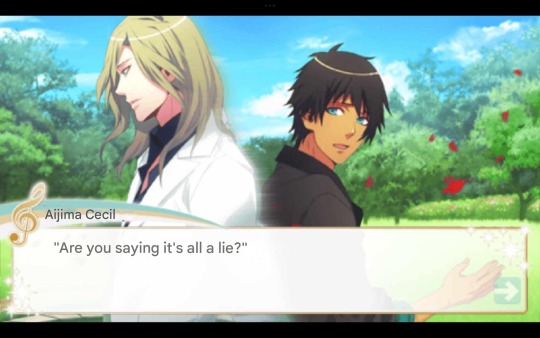
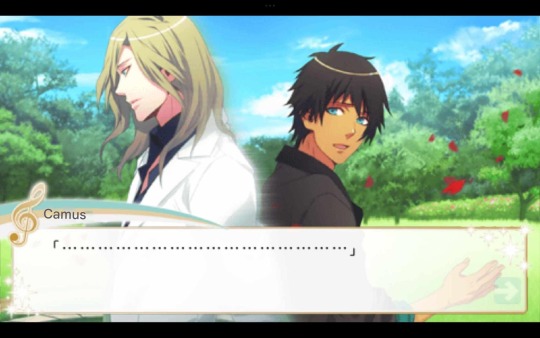
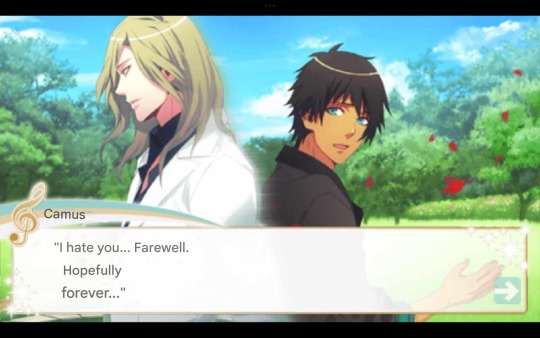
(I'll be using google lens because it's faster but I checked that the tls were okay)
He also does this in the Non-Fiction drama, which may or may not have actually happened, but I think it's still a pretty good reflection of what could happen in reality because he tells Ranmaru their bond was a lie, then mopes around in his guilt thinking about the good times and wondering why he's sad, and THEN later doubles down on the "it was a lie, I don't care about you" because he just can't let himself get attached to anything.
Basically, he's terrified at the thought of forming actual bonds because he genuinely thinks he's nothing if he stops being a cold weapon:
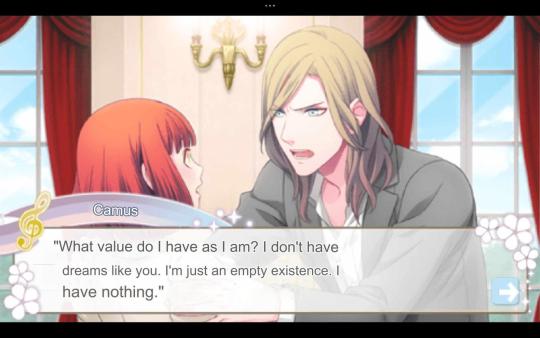
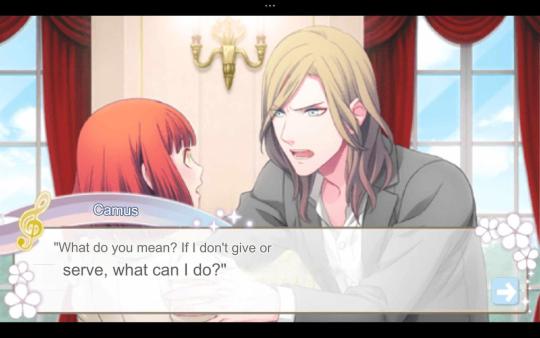
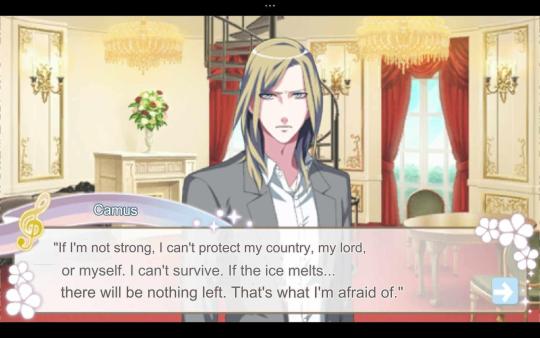
At one point he does admit he sucks (as a love interest)-
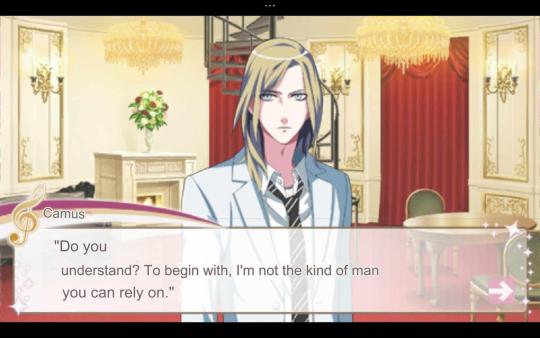
-which is pretty huge by utapri standards. I love these games, but the amount of times where a male lead does something icky, and everyone, including Haruka, acts like it's normal or like it's Haruka's fault is ehhh but I digress
Upbringing
Of course he's very proud of his homeland and status, but sometimes it's to the point of thinking he can't be anything other than his title. So why is he like this?
We got to hear about his childhood from Camus himself a few times, and it often ended with Haruka thinking "wait? that's kinda messed up?" and Camus insisting it's nothing/it's normal so yeah that's something...
His parents were in an unhappy arranged marriage, and his mother was forced to birth an heir which traumatized her so much that she can't see Camus without falling ill. Overall it's a pretty tragic situation since what happened to her was horrible, though not Camus's fault either. Even now she refuses to see him, and I wouldn't say that makes him sad because he never really met her, but simply knowing of her sacrifice probably adds a lot of pressure. As in, he only exists for this one purpose (inheriting his father's title and serving the country), so if he doesn't play his part correctly, it would have all been for nothing.
He was raised by his father not as a child or son but as the heir, always treated and judged as an adult (even during physical training apparently, make of that what you will)
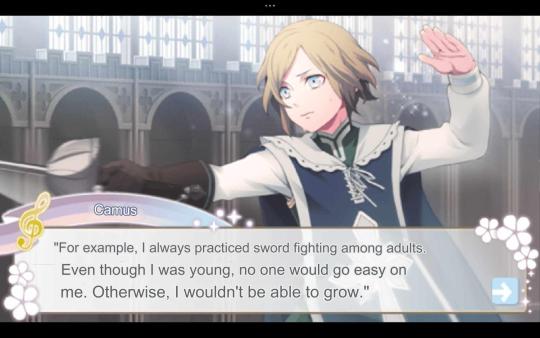
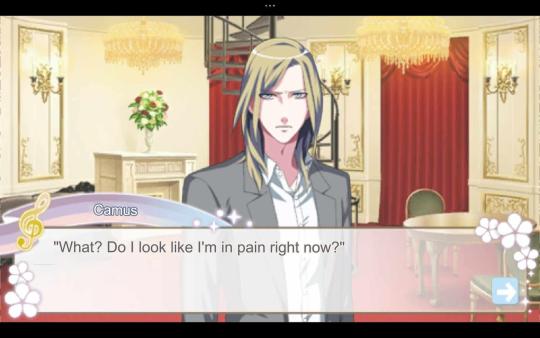
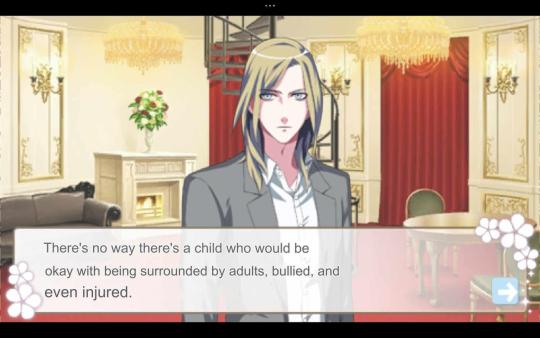
When Haruka asks about childhood memories he has a very hard time finding something that doesn't have to do with his duties or the nation. And then admits he didn't truly have a "childhood" since he was never treated like a child
As for the queen, I think his love for her is sincere: she taught him a lot of things growing up, and according to him, she's also a victim trapped by her duties so he wants to ease the burden.
So hypothetically, if he found things or people that made him happy in Japan, he would feel obligated to lock them away because that happiness is incompatible with his life: he'll have to leave when his mission ends, he shouldn't be spending time on things that aren't "useful" as he doesn't have the free will to pursue them
In his mind he's completely tied down by the fact that he was born and raised for a single reason, and the fact that he does want to serve the queen.
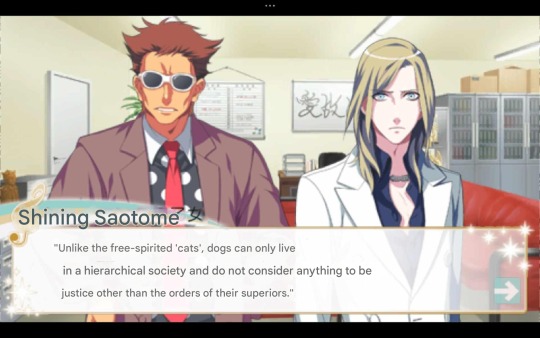
(This is Saotome describing him btw)
Also it might sound ridiculous to bring his self-worth into question because of how pretentious he is, but I've counted a few situations where he seemed to have complete disregard for his own life, only worrying about Haruka and Cecil's safety in scenes when they were present. And he thinks wanting to be loved unconditionally is a childish thought he shouldn't have.

"Double Face" was a lie. There's like at least 10 layers
On the surface he does have two personas, his perfect polite butler act for the media, and his cold bitchy attitude off camera. But honestly, even when he's not acting as a butler, he's often putting up a front to hide any form of vulnerability (from himself as well)
His main struggle is finding who he is outside of what he's being told to do. Before, he never actually stopped to think about what he WANTS because it just never occurs to him, or if it does he ignores it.
That's why realizing that he has his own desires is essential to his character development, and him staying with Quartet Night (and Haruka in his routes) is so important. It's why Reiji feels the need to reach out and when he does, Camus either freezes up or tears up;
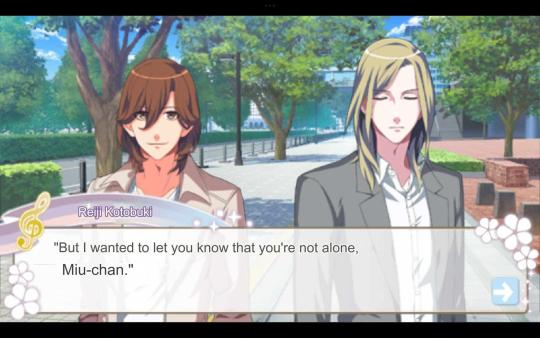
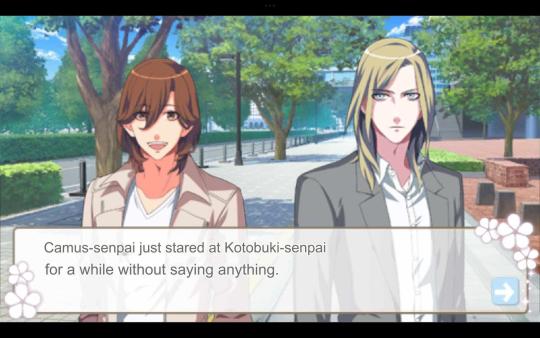
This all makes him the opposite of Ranmaru (being true to yourself and sincere), and similar to Ai (gradually learning to view the world in a less cold and logical way), but I kind of want to save that for another post lmao
He is especially hard on Cecil because Cecil says & does whatever he wants, and everything still works out for him, which is a way of life that Camus can't imagine for himself at all (despite maybe wanting it?)
That he can realize this and eventually admit out loud, despite all his pride, is also one of my favorite things about him
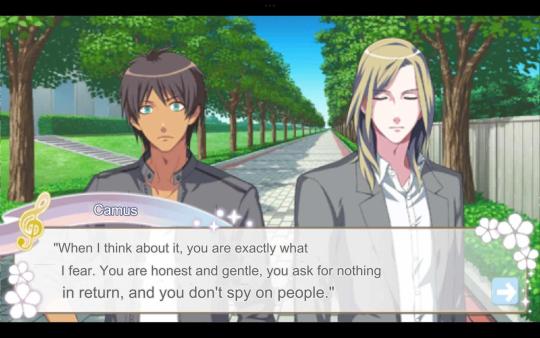
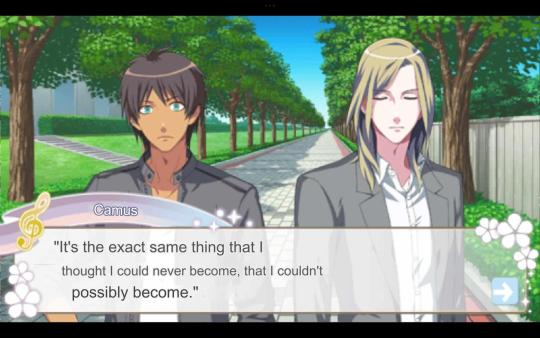
Season 2 does hint at something, so that's pretty cool!


Side note, I really love that his theme in the new Oracle series is "Change," the melting of ice.

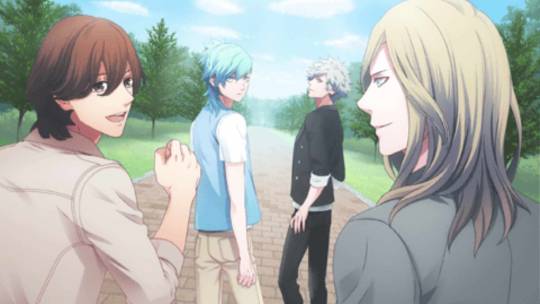
So what was the anime supposed to do??
Of course there's no way to show all this in a single episode or even during the runtime of the anime, and I never expected them to because the story is very surface-level (that goes for all characters).
It's just unfortunate since the anime is the most accessible and well-known utapri media in the western fandom, and the character's main episode is bound to leave the biggest impression.
I understand the choice of being laser-focused on the servant plotline, it's supposed to be funny (?) and waters him down to a trope that's easy to understand at first glance (the step-on-me guy I guess)
Still, I can't help but compare it to Ranmaru's episode, who was also hard to work with in the games but was chill in S3E7 and got to pet cats. Anime onlys will never know how much Camus loves to dote on his dog smh.....
#please don't take this too seriously#i just wanted to cry about camus#uta no prince sama#utapri#camus (utapri)#quartet night#cecil aijima#ranmaru kurosaki#reiji kotobuki#ai mikaze#tag for me yapping about utapri
128 notes
·
View notes
Text
Why Suletta and Miorine's story is a romance: A Mobile Suite Gundam: The Witch from Mercury story structure analysis by Sodasa
So, I recently watched The Witch from Mercury, and I felt compelled to write an analysis of the show's use of the story structure of romances. I'm a hobbyist in the history of trends in genre fiction with a particular interest in romances. I thought it would be fun to use my area of expertise to talk about how the budding relationship between Miorine and Suletta is intertwined with the story of G-Witch.
Something particular about the romance genre is that, unlike other genres of fiction, it's mostly defined by its story structure. This means that just because a story is about two people getting together does not automatically make it a romance in the same way having magic in a story qualifies it as a fantasy. The flip side of this is that while you can't have a fantasy without fantastical elements, a romance can be put in any setting. As long as the story hits the required plot beats, it's still a romance. This makes Romance simultaneously one of the strictest and most versatile genres, as the plot can be anything as long as it ties into the main characters' developing relationship. Use this structure in a story about financial politics and mechs, and you get a story like The Witch from Mercury.
I think the show uses this structure very effectively. In my opinion, a great romance should, first and foremost, be an exploration of the part of the human condition where previous bad experiences make us reject intimacy. The romance story structure is designed to have the characters come face-to-face with their inner demons by giving them a reason to overcome them. Something that's a lot harder to pull off outside of romances, as not many things in life require us to overcome some of our deepest insecurities instead of just pushing them down.
G-Witch is a great show to use as an example of what makes a romance a romance as it follows the story structure almost to a tee, but it's also not the kind of story that most people usually think of when picturing a romance. I also believe that seeing the show through the lens of the romance structure leads to some juicy character psychoanalysis for Suletta and Miorine. I'll go over all the plot beats of a romance and explain how they apply to G-Witch and, if applicable, why I think you don't see those plot beats outside of romances. The names of the plot beats are taken from "Romancing the Beat: Story Structure for Romance Novels" by Gwen Hayes, which is also my primary source, along with my own extensive experience with the romance genre.
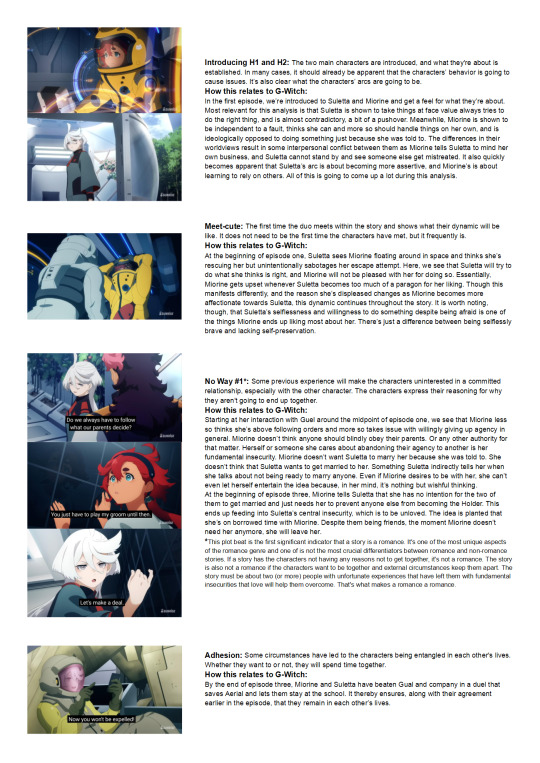
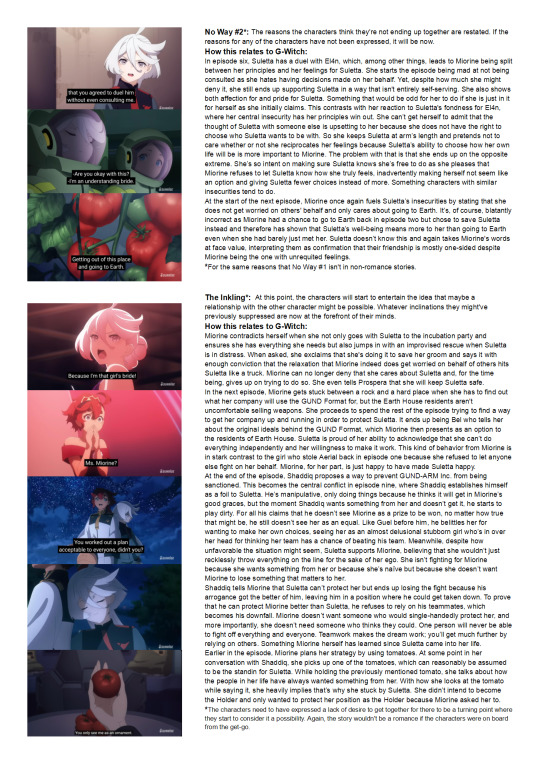


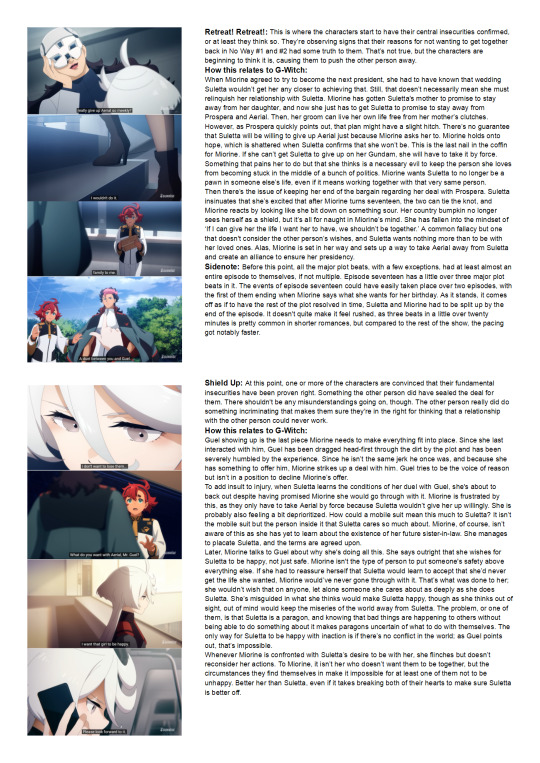


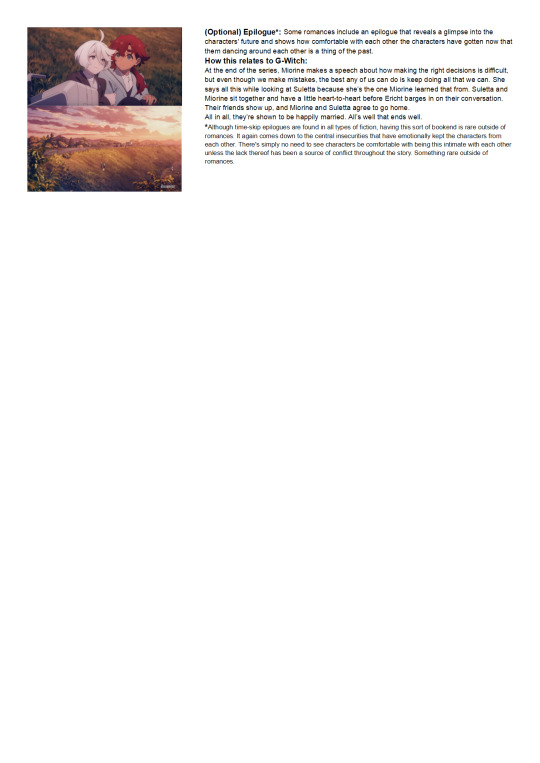
I hope someone gets something out of this. I have seen some excellent analyses and theories for this show, but they have been on things I don't know much about myself. Since the only part of story analysis I excel at is the structure of romances, I thought I'd lend my own area of expertise. I want to clarify that while I might sound matter-of-fact, this is just my opinion. I'm by no means saying that you have to think that G-Witch is a romance. I'm just arguing for why I personally consider it to be one.
#mobile suit gundam: the witch from mercury#g witch#the witch from mercury#suletta mercury#miorine rembran#sulemio#suletta x miorine#honestly I had too much fun making this#I can't write an analytical essay to safe my life#but I'll write a 7500+ words media analysis just to justify calling a mecha show a romance
287 notes
·
View notes
Text
2024 Recap: ✨A Summary✨
Post your most popular and/or favourite edit/gifset/analysis for each month (it’s okay to skip months!)
@troubled-mind and @my-rose-tinted-glasses brought this back, so here is mine! I can't believe some of this stuff happened this year, it feels like it's been 84 years.
January:
most popular - Deep character analysis of Phaya from The Sign
favorites - The birth of Japanese QL Corner, Breakdown of the Last Twilight finale (siiiigh), love for I Became the Main Role in a BL Drama and Gyeongseong Creature, and this list of some of my fav non-BL jdramas
I was a busy little bee in January! Not surprising, as I tend to hermit at home in the deep winter and do nothing but watch dramas and post too much. JQL Corner became my big project of the year, and I can't believe there wasn't a single week that I didn't have Japanese QL to talk about. I Became the Main and Gyeongseong were both surprise delights that ended up among my favs of the year. I’m still holding my LT grudge, in case anyone had any doubt.
February:
most popular - Praise for Dead Friend Forever's mystery arc
favorites - Appreciation for Love for Love's Sake's ending, every single LITBC book club post that I either wrote or read, my final review of Cooking Crush
The original run for the LITBC book club that @bengiyo and I led! What a great time reading a fantastic book, chatting with besties, and making new friends. I also stand by that praise for DFF's mystery arc--that was the strongest part of the show; the things I took issue with were elsewhere in the story. I have just been thinking I need to rewatch LFLS and this post reminds me why (I remember when it first ended me and @wen-kexing-apologist were like, we're going to watch it again immediately! And then realized we were in no way emotionally prepared for that LMAO). Cooking Crush remains a fav and I may or may not be rewatching right now.
March:
most popular and favorite- An actual love letter to TsukuTabe, my beloved
other favorites - Analysis of Unknown ep 6 aka The Turning Point and big love for Cherry Magic Thailand after the finale
Wow, three of my very favorite shows of the year all happening at once. What a blessed month this was. Also, this is not a specific post, but this is the month when I read Da Ge and then spent weeks with people coming into my DMs to get their own copy of the translation, which was a top fandom experience for me because I met a bunch of new people, some of whom stuck around to talk about Unknown, and it made me feel like an illicit dealer which was very fun.
April:
most popular - The boopening
favorites- A breakdown of the pseudo-incest trope and this list of my favorite friends to lovers dramas
The boopening was a once in a lifetime whimsical tumblr event, and I am so glad I was able to participate fully. I also really like these other two because I feel strongly that all tropes have their place and can be enjoyed when executed well and I love talking about that.
May:
most popular - Love for Oyei and Cher from Wandee Goodday
favorites - Trans Allegory in Cupid's Last Wish, co-authored with @wen-kexing-apologist and @so-much-yet-to-learn and this cdrama rec list.
I spent much of May watching and posting about shows I did not end up liking much in the end, but that is also the month I finally watched CLW with my friends and enjoyed it more than expected, in part because WKA had us watch it through the lens of trans allegory, which totally worked.
June:
most popular - Class disparity themes in Love Sea
favorites - 10 Things I Love About Triage, celebrating Thai marriage equality with @my-rose-tinted-glasses, praise for Marahuyo Project
What a fun Pride month with the start of Love Sea, Knock Knock Boys, Marahuyo Project, The Trainee, and me finally watching Triage.
July:
most popular - Teaching the youths about face fucking and power dynamics in Love Sea
favorites - 10 Things I Love About Oppan and The Miracle of Teddy Bear Saved the Gays with @twig-tea
More great shows. I'm so glad me and Twig ignored the rumors and watched Teddy Bear because it's one of my favorite Thai dramas of all time.
August:
most popular - Cheering on the defeat of noble idiocy in Love Sea
favorites - Praise for Knock Knock Boys and this spicy JBL rec list and this other quality JBL rec list and calling out weird fandom attitudes about JBL
Another good month, and the busiest by far for QL Corner. There were so many JQLs airing this summer! What a time to be alive.
September:
most popular - Documenting Wang's behavior in The On1y One
favorites - 10 Things I Love About Mr. Mitsuya's Planned Feeding, clocking Doku Koi as a fav early, this high school bl rec list and this BL romance rec list
I'm filled with so much bitterness reading that Wang/Tian post. I'll be taking this grudge to the grave!
October:
most popular - Moar boops
favorites - Analyzing Dohoe in Let Free the Curse of Taekwondo and celebrating the first two episodes of Love in the Big City and the creation of the LITBC Drama Book Club Round Up
Two moody Korean shows with complicated gay leads dropped in my birthday month, the book club band was back together, and I got to do Halloween themed boops. I WAS THRIVING IN OCTOBER.
November:
most popular - On fandom as a life saving force
favorites - This list of some of my trash favs for @happypotato48 and getting my feelings out on Young and Gyuho and Hirukawa and Minase and final thoughts on the LITBC drama
I was having a lot of feelings in November.
December:
most popular - Democracy in Squid Game 2
favourite - QL superlatives and grievances, this round up of my fav dramas of the year and being so very normal about Hirukawa
This write up really helped me appreciate that I had good stuff to watch and write about every month this year. There were some disappointments, but also a lot of shows I really loved and it was fun to remember some of the things I wrote. Also, i got to make so many fun rec lists! If you were tagged here, or if you just see this and want to join in, consider yourself invited to do your own!
You can go here to find your top 10 posts of each month.
42 notes
·
View notes
Text
2024 Recap: ✨A Summary✨
Post your most popular and/or favourite edit/gifset/analysis for each month (it’s okay to skip months!)
@lurkingshan tagged a post that I was a co-author on and thus I am feeling inspired to also do this post.
January:
most popular: Comparison of Tharn and Phaya irl and in fantasy
favorites: Top 5 "Oh" Moments Ask || Feelings Made Visible: Design Choices in The Sign post.
I loved getting asks, so answering the "oh" moment question was really fun! And as disappointed with the quality of The Sign by the end, I still really love the essay I wrote reading way to in to the color and lens flare choices and how they relate to the animals Tharn and Phaya are associated with.
February:
most popular: Symptoms of a System Error: The Manifestation of Myungha’s Depression in Love for Love’s Sake
favorites: Symptoms of a System Error: The Manifestation of Myungha’s Depression in Love for Love’s Sake || The Ways Non was Failed in Dead Friend Forever || DyFy Body Language Breakdown
Love for Love's Sake was fucking incredible, and I had so much goddamn fun writing this post about the ways in which different video game structures are implemented in this series. Dead Friend Forever may have stumbled right at the end in my eyes but holy hell was the writing around the abuse Non suffered strong! And you know I love me some Fire and Dynamite.
March:
most popular: Pitch to get people to watch Love is Better the Second Time Around.
favorites: Trans Allegory in Cupid's Last Wish, co-authored with @lurkingshan and @so-much-yet-to-learn || Unknown Episode 6 Breakdown Breakdown || Top 5 (or 3) Seme & Ukes Ask
CUPID'S LAST WISH IS A TRANS ALLEGORY EVERYONE AND EVEN IF THE NARRATIVE IS NOT THE STRONGEST I THINK IT IS WORTH WATCHING FOR THAT REASON. Ohhhh Unknown how I loved writing essays about you...And of course, I am going to love any opportunity I am given to talk about 180 Degree Longitude Passes Through Us
April:
most popular: Episode 10: The Couch
favorites: Episode 10: The Couch || Parallels in Unknown Episode 9 || Losing my mind over Unknown Episode 8 || Unknown, Episode 10: Qian and Yuan || Favorite Body Language Indicators Ask || Favorite Physical Acting Performances
Y'all. I wrote SO much in April and so much about Unknown in April. I am beginning to understand why my writing petered out the next couple of months. But damn if Unknown did not go hard for so long, I had so many worms in my brain about it.
May:
most popular: Episode 12: Ties
favorites: Episode 12: Doors!
June:
most popular: How in character Dee and Dr. Devil's research was
favorites: And the Hands Have It!
It felt like it had been forever since I wrote about hands/body language so I was very excited to have some inspiration to actually write again.
July:
most popular: I Love Ayaka is in Love with Hiroko and I think everyone should watch it
favorites: I really enjoyed doing the Asian QL Ask Game
Ohhh how the mighty have fallen. I loved so much of Ayaka is in Love with Hiroko and I'm glad I was so passionate about it at one point, but I was sad about how it ended. I love when the tumblr community does the tumblr community thing and we get to spend some time passing around tags and asks and getting to know more about people's likes and dislikes in different aspects of BL. I feel like it encourages people to write more about shows and I love seeing new analytical posts about the shows I am watching.
August:
most popular: I’M BACK BABY! Takara’s Treasure, Ep. 7 Scene Breakdown
favorites: I am being so so sincere when I say that Episode 10 of The Miracle of Teddy Bear has just secured a spot as one of my favorite BL episodes of all time. || I'M BACK BABY! Takara's Treasure, Ep. 7 Scene Breakdown
GOD I LOVE THE MIRACLE OF TEDDY BEAR, definitely one of my favorite posts of the entire year. But I can't not thank Takara's Treasure for giving me enough to work with to write my first scene break down in a fourth month time gap.
September:
most popular: Bengiyo's Queer Cinema Syllabus: The Watermelon Woman
favorites: Bengiyo's Queer Cinema Syllabus: The Watermelon Woman
lmfao this was the only thing I wrote in Sept.
October:
most popular: praise of how The Legend of Vox Machina adapted The Chroma Conclave Arc from Critical Role
favorites: Love in the Big City Ep 1-2 || Love in the Big City Ep 3-4
Spoiler alert: Love in the Big City was such a fun viewing/fandom experience and I loved every minute of watching and writing about it with the book club people!
November:
most popular: Literal Heart Eyes
favorites: Love in the Big City Ep 5-6 || Love in the Big City Ep 7-8 || Bengiyo's Queer Cinema Syllabus: The Handmaiden
December:
most popular: Random QL Superlatives
favorites: Random QL Superlatives || QL Grievances
I loved giving awards to the most ridiculously niche moments in TV shows. I had so much fun coming up with the superlative categories!
It's funny because I feel like my writing really dropped off a lot this year. But doing this 2024 Recap was super enlightening for me to see that maybe I just do not understand the passage of time because I did actually write stuff every month!
You can go here to find your top 10 posts of each month.
#2024 BL Recap#Love in the big city#unknown the series#legend of vox machina#the watermelon woman#the handmaiden#takara's treasure#cooking crush#love for love's sake#love is better the second time around#the sign#ayaka is in love with hiroko#the miracle of teddy bear#dead friend forever
20 notes
·
View notes
Text
welcome to total drama wlw week! (introduction/pinned)
the purpose of this event week and blog is to celebrate and shine some light on an overlooked part of this fandom, and give some love to wlw creators who are often unappreciated for their work. as well as promoting wlw ships that aren’t always given a lot of love!
EVENT DETAILS & RULES:
drawings, fanfics, animations, edits, posts of headcanons, pinterest boards, socmed AUs, etc. are all allowed!
you can make as many posts as you want!!
you don't have to post every day!
tag #tdWLWweek24 on any social media posts
this is a tumblr based event, so post your works on tumblr, but feel free to participate/spread the word on twitter, tiktok or whichever social media you prefer to promote your work as well.
the prompts are guidelines more than rules, but do try to follow them (especially for art & fanfic)
you can choose one of the prompts given on each day, or if you’re feeling creative, try to combine them both!
it doesn’t need to be ship content! you can write an analysis of your favourite girl character through a queer lens, you can draw her wearing the colours of the bisexual flag, you can write a oneshot of two lesbians being best friends, etc.
for ship content, please make WLW/sapphic ships the MAIN FOCUS, not sidelined or briefly mentioned alongside straight or mlm pairings. fics/art that centre non-sapphic pairings will not be reposted.
celebrating other queer identities in this event is of course fine (trans, non binary, aspec, etc) but the centre of the event is wlw/sapphic identities so be sure to make that the highlight.
you do not have to be wlw yourself to participate, but of course always listen and make room for wlw creators & do your best to represent wlw stories with guidance from your wlw mutuals & friends <3
if you follow all these rules, you will be reposted/reblogged by us!
the rules listed are not to limit people in their creativity but just to ensure this remains a wlw/sapphic centred event, in order to highlight & celebrate wlw specifically.
PROMPTS & DATES:
DAY 1: thursday, 24th october - campfire / historical au
DAY 2: friday, 25th october - sunlight / butch character
DAY 3: saturday, 26th october - put a spin on a myth, ‘canon’ literary story, or fairytale that includes your pairing of choice (the tale be from any culture or country of origin!)
DAY 4: sunday, 27th october - rollercoaster / superhero au
DAY 5: monday, 28th october - robbery / proposal
DAY 6: tuesday, 29th october - double date / horror au
DAY 7: wednesday, 30th october - free prompt / rarepair
BONUS: thursday, 31st October - write something for HALLOWEEN!
EXTRA INFORMATION:
this is a blog I started as a response to a lack of appreciation + overall content being made for wlw/sapphic fans of the show! many wlw creators have been making content for ages and not getting a lot of appreciation, and (like many other fandoms) it seems that our pairings and stories aren't given as much of a spotlight or appreciation as heterosexual or gay ones.
I also thought it would be fun! There's no pressure to make lengthy 20 chapter fics or portfolio-ready fanart for this event (though you are perfectly at liberty to do so), you can also make pinterest boards, share headcanons, create socmed AUs, or whatever creative outlet you choose, to celebrate the wlw characters and pairings YOU love.
once this event week is over this blog will remain active, reblogging any posts that are late or just sharing more wlw headcanons, content and rarepairs.
#total drama wlw#total drama#total drama fanart#total drama fanfiction#total drama fanweek#wlw ships#tdwlwweek24#gwourtney#heathney#heatherra#jasammy#gwoey#jomaria#mkulia#nichaxel#prillie#izva
28 notes
·
View notes
Text
I've watched a few different youtube channels where professional therapists interpret fiction through the lens of their profession. And one thing I've noticed that also reflects my experiences with therapy is that this type of interpretation tends to leave huge gaps in their analysis where the political context and material reality of the characters is. It feels bizarre to hear someone talk about Night in the Woods or Arcane and spend the entire time talking around the politics
There is media where the therapist approach works really well! I've been watching Euro Brady's Slay the Princess videos and with the game being so much about interpersonal relationships, the different ways those develop, and how the way we interact with people shapes all parties—all the talk of emotional range, defense mechanisms, etc makes a lot of sense and offers in interesting perspective on these things
I've also started watching his Disco Elysium videos and having fun so far, I'm interested to see where those go because Disco Elysium is a game that will outright mock the player for trying to avoid engaging with the politics of the game. It's not only intensely political, it is aggressively in-your-face about politics. So far he's followed the trend of mostly avoiding engaging with the politics too deeply, but I've seen one of his later DE videos is titled something like "Am I a Communist??", so I'm curious if the game manages to pull more political discussion out of him
32 notes
·
View notes
Text
Masculinity in tf2 is actually a topic I really like delving into, I think tf2 is really a great thing to do this kind of analysis on because I don't think it tries to "say" anything about masculinity, it's just a pure representation of its writers' and developers' ideas. It's also basically ALL abt Scout LMAO like listen to this. Sniper is skinny and weird and "not masculine" in appearance, but isn't treated poorly for it probably because he has a bunch of practical Manly(tm) hobbies like idk. trout fishing, while Scout is treated poorly for being skinny and weird because there's a certain desperation to him that Sniper just doesn't have. Multiple men characters are shown to have close relationships with their mothers, but Scout's is portrayed as a kind of childish weakness while Demo's and Heavy's are treated as more respectable, because they provide and that's what men do. Through both a lens of masculinity as measured by like. being tall and jacked and a lens of masculinity as measured by "being successful" (money and girls, basically), Scout is a failure while even someone like Spy is not. This isn't me trying to #cancel tf2 or anything LMAO it's just fun to do this kind of analysis sometimes, it says a lot about men in the 2000s and 2010s and I like dissecting that
248 notes
·
View notes
Text
The Good, the Bad and the Ugly: all of my thoughts (part 1)
All right, this is me, watching my way through my current obsession The Good, the Bad and the Ugly for the umpteenth time and rambling about everything that comes to mind as I go, which ended up with me typing over thirty thousand words because I am incapable of shutting up. Because that is truly excessive, I will be posting my thoughts in three parts; this is part one (covering roughly the first hour and thirteen minutes of the Extended Cut, up through the end of the desert/carriage sequence), and I'll probably post part two in a few days to a week, pending editing and such and some of the other things I should be doing.
Because that's a lot of reading to commit to without knowing what you're getting into, especially if you're here from the tag, here's what to expect in brief:
This is all of my thoughts, simply whatever comes to mind, but my thoughts on fiction tend to be heavy on in-depth analysis of characters, their motivations and how they tick, so a lot of this falls into that general category.
In particular, there will be a whole lot of thoughts on Tuco, Blondie, and their evolving character dynamic, which is my favorite part of the movie. I will not be looking at it through a shippy lens, for what it's worth (romantic shipping is not generally how I personally engage with fiction), but I hope anyone who finds their dynamic compelling in whatever way might still enjoy some of my thoughts on them!
In between, there's also a bunch of other commentary on stuff like the narrative function of scenes (especially on the scenes that were cut in the International Cut of the film and whether the film is better with or without them), directorial or editing or production design or storytelling choices, acting choices, foreshadowing and parallels, as well as some lighter commentary on bits that amuse me or bug me or that I particularly enjoy.
Sometimes I will just be making observations about random things I didn't necessarily notice or pick up on on my first viewing; many of them are probably kind of obvious, but if I didn't pick them up seeing it once, probably there's at least a chance they might be interesting for other people who have only seen it once.
This is not a recap of the movie, but I do try to quote lines or explain bits that I'm commenting on, so hopefully you can follow along if you've seen the movie at all. I don't know how coherent this would be if you haven't seen the movie, but if you choose to read a post like this about a movie you haven't seen anyway, godspeed to you.
Tuco's introduction
The opening scene sure is a microcosm of Sergio Leone's directorial style. Slow, silent close-ups, wide shots, unclear exactly where the scene is going initially, these unnamed characters eventually converge on a saloon -- and then instead of following them inside, Tuco comes crashing through the window and we freeze-frame. It's very drawn out (I had a bit of an "Is the whole movie going to be like this" moment watching it for the first time), but the comic timing of Tuco and the freeze-frame is great; instantly we go from this super slow, dramatic buildup to this fun, humorous subversion that really sets a tone. All that buildup was actually for introducing this guy.
In the process, we learn that 1) Tuco is someone at least three different people want to kill, 2) he's someone skilled and resourceful enough to manage to shoot them first and then make his escape through the window even after being caught unawares during a meal by three people working together, and 3) even in the process of doing that he brings his food with him -- probably actually pretty revealing about his background of poverty, not wanting to waste food when he has it. We'll of course see him introduced further a little later, but this really says a lot for only actually containing about ten silent seconds of him, and also benefits from being funny.
It's kind of amusing how bloodless most gun deaths are in this movie, considering it doesn't shy away from blood in other parts. The surviving bounty hunter does have some blood on his hand as he tries to shoot after Tuco, probably to convey that he's injured despite still being alive, but the others are just cleanly lying there with no signs of damage. Maybe it's paying homage to what other Westerns looked like -- the actual cowboy gunslinging specifically is very idealized, sanitized and almost cartoonish, compared to a lot of the other violence in the film. I remember being a kid and hearing about the trope of people in old Westerns getting shot and dramatically going flying as a result, despite that normal bullets are far too small for their momentum to send a person flying anywhere -- you don't actually see too much of that in modern movies, where everything tends to look much more realistic, but this movie definitely has a lot of very dramatic flailing and spinning around when people get shot in a way that looks pretty distinctly silly and cartoony today. Ultimately it meshes pretty well with the overall tone of the film, though; this movie is gritty in many respects, but it does not aspire to realism.
Angel Eyes' introduction
The way Angel Eyes just silently waltzes into Stevens' home and helps himself to some of his food while maintaining eye contact the whole time is so weird and uncomfortable, it's delightful. What an entrance.
Stevens has a limp. People who have fought in the war tend to be visibly scarred by it in this movie -- truly something that just permeates every background detail, that you don't really think about on a first viewing when you think the Civil War is just a setting backdrop.
There is zero dialogue in this film until more than ten and a half minutes in (though the first three minutes of that are the opening credits, so it's seven and a half minutes of actual movie with no dialogue). I think this is a very fun choice which contributes to the viewer really feeling how unbearable the silence is for Stevens by the time he starts asking Angel Eyes if Baker sent him - half of that silence wasn't even technically part of this scene, but it really intensifies it by making the silence here feel even longer than it is.
When Stevens says, "I know nothing at all about that case of coins!", Angel Eyes looks up with interest from where he'd been casually looking at his food. Evidently he had had no idea there was any case of coins involved, only that he was meant to collect a name, but once Stevens mentions it, his interest is piqued.
Angel Eyes casually offers, "Well, Jackson was here, or Baker's got it all wrong," while cutting off and eating a piece of bread with a large knife, sort of implicitly daring Stevens to try to say Baker's got it all wrong and see what happens. When he's got Tuco captured later, Angel Eyes does a similar thing of staying friendly-threatening as he casually asks questions, but once Tuco actually refuses to talk of his own accord, out come the claws. This time, though, Stevens does not take the bait, probably sensing that that would lead nowhere good for him.
He says, "Maybe Baker would like to know just what you and Jackson had to say about the cash box" -- this isn't the info he came for, but maybe Baker would be interested. Really it's Angel Eyes himself who is intrigued -- he'll go on to tell Baker that that's my bit. But he doesn't really bother pushing Stevens for it, instead moving on to admitting he's being paid for the name specifically. Probably he figures once he gets the name, he'll have all the info he needs to track him down anyway by his usual means (which it turns out he does).
The casual, grinning confidence of Angel Eyes' assertion that if Jackson weren't going by an alias he would've found him already, "That's why they pay me," really makes you believe it, doesn't it. It's exposition about what Angel Eyes does, but is also executed to work as a nice character-establishing moment about his competence.
Christopher Frayling's otherwise fun and informative commentary on the film talked about how Angel Eyes' missing fingertip was provided by a hand double in the final truel -- but you can see in this scene that Lee van Cleef's own right hand is definitely missing that fingertip (though I did not notice it at all until I thought to specifically look for it). Very curious where the notion of a hand double came from -- he even named a specific guy.
Angel Eyes casually announces that when he's paid, he always sees the job through, even though that's just going to make Stevens desperate -- Angel Eyes knows he can shoot first, no big deal.
He shoots Stevens through the table and the food, even. How does he aim.
Angel Eyes grabs his gun and turns around to shoot Stevens' son before he actually comes into view (specifically, we see him start to react to something about ten frames before we can first see the tip of the son's rifle). Presumably, in-universe, he heard him coming, but we don't hear him coming at all over the blaring background chord, so it feels like Angel Eyes just knows he's coming by some sixth sense. Very effective at making him seem even more threatening, especially since there's also generally a conscious decision in this movie to act as if the characters can't see anything that's out of frame for the viewer -- Blondie and Tuco get caught out by that rule a couple of times in amusing ways, but Angel Eyes actively defies the auditory equivalent.
(It's neat how the family photo, used for Angel Eyes obliquely threatening Stevens' family, also serves as foreshadowing for the fact he also has this second, older son we hadn't seen yet at that point.)
The fact Angel Eyes sneaks into Baker's bedroom when he's sleeping to report back is so extra. A normal person would just arrange to meet him the next morning, but no, Angel Eyes does the creepy stalker thing. Probably makes the murdering him in his bed bit a little easier, though, which also suggests he was definitely intending on that bit the whole time and didn't just "almost forget".
Baker's brow furrows and his eyes shift uncomfortably when Angel Eyes mentions the cash box; clearly he was hoping Angel Eyes would never find out about that bit (very reasonably, given what happens next).
All in all, Angel Eyes' introduction is super striking. The casual veneer and smug grins painted over a deeply tense sense of threat; the absolute deadly confidence; the fact he shoots Stevens' son too so easily and presciently, almost as a footnote to it all; casually walking out with the money that Stevens offered him for sparing his life; and then, on the ostensible basis that when he's paid he always sees the job through, casually killing Baker too.
Although he explains the murder of Baker as simply seeing the job through, though, Stevens didn't actually ask him to kill Baker; all he ever suggested he wanted was to be left alone, and all he said about the money was that it's a thousand dollars, after asking what Angel Eyes was being paid for murdering him. I expect Angel Eyes simply chooses to take it as payment for the 'job' of killing Baker for motivated reasons; that way, he can act as if the money is still 'payment' for him even though he rejected Stevens' attempt to bribe him, and it's much easier to go after the cash box himself if Baker's out of the picture, after all.
This creates an interesting ironic sense that while Angel Eyes effectively presents his own introduction as being all about his unassailable professional principles about always performing the job he's been paid for, and I took him at his word on my first viewing, he's not really all about those principles at all -- and as the movie goes on, indeed, he's simply pursuing the cash box for his own reasons rather than because anyone's paying him for it. His 'professional principles' don't come up again, because that's not really what this intro was telling us at all.
Which isn't to say he doesn't always see a job through after being paid (I can definitely believe that; if he has a reputation for getting the job done no matter what, that makes people more likely to pay him in the future, and he sure has no qualms about completing any job), just that that's not at all the main thing driving his character, as you might initially assume. The thing his intro is really telling us about him is that he's ruthless, terrifying, extremely competent, very interested in this cash box, and has absolutely no trouble casually murdering whoever might be standing in the way of accomplishing what he wants. And I think it's very effective at showing that.
Blondie's introduction
This scene opens with Tuco on a galloping horse in a way that naturally invites the viewer to assume this is following directly from when he flees from the saloon in his intro, and that's what I assumed on my first viewing -- but nah, not only does he not have the food and drink, he's wearing different clothing. Given the surviving bounty hunter from the intro will be appearing later and indicating that was eight months ago, and this is decidedly the most obvious place for the bulk of the timeskip to be happening, probably this is actually several months later. This film is not at all big on time indicators -- for the most part, we have no idea how much time is passing, everything feels like it's happening pretty much in sequence, and we can only vaguely infer that there must be longer gaps between particular events.
The straight-up photograph on Tuco's wanted poster is pretty hilarious. There's even a scene later with a little gag about the long exposure times for photographs at the time. Probably this is just a funny prop for two scenes to make it very obvious to the viewer that it is absolutely him on the wanted poster even as he adamantly denies it, but it's also very funny to imagine Tuco patiently posing for his own wanted poster.
Framing through it, all three of the bounty hunters surrounding Tuco when Blondie comes along are in fact going for their guns when Blondie shoots them, which makes sense -- for all that Blondie is not much of a noble hero, he generally does not tend to shoot people until they're at least starting to draw on him. (There's one notable exception, which will come up in part two.)
I enjoy Tuco's weird little nervous, disbelieving grin as he realizes this stranger just shot the bounty hunters but is sparing him. Tuco's own worldview, as shaped by his background, is dominated by self-interest; it's every man for himself, and it's up to him to do whatever it takes, tell whatever lies, betray whoever he has to, to get ahead. And yet, there's this endearing naïveté to him, where he's not really suspicious of other people's motives accordingly -- he's surprised Blondie would save him, but his brain doesn't immediately go to this guy just wants to be the one to collect my bounty. We see this a lot throughout the film.
We cut (with great comic timing) from Blondie sticking a cigar in Tuco's mouth to Tuco spitting out a cigar while tied up on his horse as Blondie takes him into town -- an edit that suggests continuity, like only a short time has passed and it's the same cigar that he just hadn't had the chance to spit out yet (sort of dubious if you really think about it, since surely it would've taken a bit for Blondie to tie him up and get him onto his horse). This reinforces our initial assumptions about what's happening, where Blondie would just have tied him up before riding straight into town, but given the con they turn out to be running, there must have actually been an offscreen conversation about it and the cigar is there as a bit of cheeky misdirection for the audience.
(It probably makes sense that when Blondie put the cigar in his mouth, he was actually about to propose they run this bounty scheme together -- as the movie proceeds, we see that Blondie generally shares cigars in more of a friendly sort of way, after all.)
"I hope you end up in a graveyard!" yells Tuco. They sure do all end up in a graveyard! This is some very cheeky foreshadowing and I love it.
Tuco yelling ineffectual threats about how Blondie can still save himself by letting him go, while actually tied up and completely at his mercy, is just extremely Tuco.
Then he shifts tack very abruptly to saying he feels sick and needs water, only to then spit in Blondie's face. Later he furiously calls the deputy a bastard just for walking out of a building, only to then immediately shift to saying he's just an honest farmer who didn't do anything wrong. Tuco often does this, shifting from one approach to the next in a way that makes it really obvious he's bullshitting, but he keeps doing this, just throwing shit at the wall to see if anything sticks, even when this is counterproductive to the whole effort. He is presumably playing it up a bit here, but it's still in its own way pretty representative of who he is and what he's actually like. He's so characterful.
"Who says so? You can't even read!" says Tuco about whether it's him on the wanted poster, which is some delightful nonsense hypocrisy/projection given we will later see that Tuco himself can only barely read. I love him. (And why would reading even have anything to do with it; he's obviously looking at the plain actual photograph of him right there. Love Tuco's absolute nonsense.)
Another absurd change of tactics: "Hey, everybody, look, look! He's giving him the filthy money!" - as if he's going to rally onlookers against the sheriff and Blondie somehow on the basis that money is exchanging hands, isn't that suspicious.
Tuco calls Blondie Judas for accepting the money (referencing the thirty pieces of silver, of course), which will get a fun echo later.
"You're the son of a thousand fathers, all bastards like you!" I love that Tuco has invented compounding recursive bastardry just for Blondie. Not only is he a bastard, all one thousand men his mother slept with were also bastards. Glorious. (You can see Blondie's amused by this one; he actually smiles a little bit before throwing a match at him.)
I wonder if Blondie actively encouraged him to go quite this hard on the insults, to make them look less associated, or if he just did this. One would think it would be risky, on Tuco's end, to be this over the top in literally spitting in the face of the guy who could just let him hang if he happened to change his mind -- but then again, Tuco genuinely doesn't expect Blondie to double-cross him.
Tuco's crimes, as of this first hanging, are: murder; armed robbery of citizens, state banks and post offices; the theft of sacred objects; arson in a state prison; perjury; bigamy; deserting his wife and children; inciting prostitution; kidnapping; extortion; receiving stolen goods; selling stolen goods; passing counterfeit money; and, contrary to the laws of this state, the condemned is guilty of using marked cards and loaded dice! All this paints a picture of a pretty colorful backstory, but most of it is relatively petty; other than the murder (possibly of people like the bounty hunters we saw him dispose of in the opening), we can gather he's been scrounging up money through anything from cheating at cards up to armed robbery and kidnapping, he lied under oath (checks out), he set a prison on fire (presumably to escape), he ran off from his wife and kids and then married someone else he presumably also ran off from, and then there's "inciting prostitution" which I'm guessing means offering someone not previously engaged in sex work money for sex.
It obviously checks out that he'd do anything for money, and bigamy and deserting his wife and children rhyme with his off-hand mention at the monastery later that he's had lots of wives here and there; in general, it tracks that he would make big commitments and then just break them. So all in all, these seem like probably a bunch of genuine crimes that he actually committed. (He also nods somewhat smugly at the marked cards and loaded dice bit.)
Blondie's MO seems to be to first shoot the whip out of the hand of the guy who's meant to be setting the horse off and then shoot the actual rope (and then random attendees' hats, for good measure). Better hope that first shot doesn't spook the horse.
It really is very reasonable of Tuco to want a bigger cut for being the one running the risks; you wouldn't generally want to do a job with a significant chance of getting you killed without being very well compensated for that. Unfortunately, Blondie doing the cutting means he's the one with all the power here -- if he's dissatisfied with his share, he can just pocket all the money and let Tuco die -- which puts him at the advantage in the negotiation, and he knows it.
I enjoy how in the middle of "If we cut down my percentage, it's liable to interfere with my aim," Blondie offers Tuco a cigar, this casual friendly move in the middle of what is effectively a threat.
Tuco does a little understated, "Hmm," of acknowledgement that makes it feel like this was genuinely unexpected. But then he just returns the threat: "But if you miss, you had better miss very well. Whoever double-crosses me and leaves me alive, he understands nothing about Tuco." Which sets up his quest for revenge on Blondie after the double-cross, obviously, but is also fun to recall during the final scene: Tuco actively advised Blondie not to leave him alive if he was going to double-cross him.
Tuco why are you eating the cigar
Next time he's in the noose, it's for a whole new list of crimes that ends with, "For all these crimes, the accused has made a full, spontaneous confession." Yeah, he probably just went off spewing confessions to a string of colorful invented offenses as Blondie brought him in, didn't he, maybe hoping it would raise the bounty. (At the cinematic screening where I saw it for the first time, I missed the spontaneous confession thing due to no subtitles and spent half the movie experiencing some jarring mental dissonance over Tuco's growing goofy likability versus the offhandedly having been convicted of multiple rapes near the start thing. But it's actually pretty strongly telegraphed that the new crimes here are simply bullshit; a spontaneous confession to a variety of new things that were decidedly not on the earlier list, that he could not possibly have done in the implied presumably not very long timespan between the first and second hanging, mostly distinctly more dramatic crimes than the original set, all sounds strongly like a Tuco throwing shit at the wall thing.)
Tuco looks a lot more restless during the second hanging, where for the first one he was pretty calm -- probably a little bit nervous about Blondie's "liable to interfere with my aim" remark, even though they'd presumably come to an agreement to stick with the 50/50 split.
He notices a woman being scandalized, seems sort of put out for a second, but then growls at her to scare her more. What a Tuco.
Another minor character presumably disabled in the war: Angel Eyes' incidentally legless informant. (Whom he calls Shorty, like the guy Blondie teams up with later, who is definitely a different guy because that guy has legs -- sort of a funny aversion of the usual one Steve limit. Genuinely a bit puzzled by why they did that -- is it like that in the Italian version or just the English dub?) I wonder if the bit where he moves around by holding a couple of bricks and using them to walk on is something inspired by a real person or people at the time.
Calling him a 'half-soldier' is pretty rude, Angel Eyes.
Look, I'll accept that we're calling Blondie Blondie, sounds like that's what you'd call him in Italy, but there's really no excuse for "A golden-haired angel watches over him." The man's hair is brown. It's not even a light brown. What are you talking about, Angel Eyes.
But to not get too distracted by that part of the line: Angel Eyes obviously recognizes the con they're running. I think that's probably because he knows of Blondie and that this is a thing he does (he's presumably done it with others before), so when he notices Blondie's around at a hanging, he's like ah, yes, there's him doing his thing, guess he's running with Tuco now. My own feeling is Blondie and Angel Eyes basically only know of each other, though -- no direct evidence they're not more familiar or anything, but they don't really act like they have a personal history, I think, compared to Tuco and Angel Eyes who obviously do.
After the threat about a pay cut being liable to interfere with his aim, I originally figured Blondie missing the rope (or rather, it seems to have grazed but not severed it) might have been deliberate, meant to scare Tuco a bit and make him think twice about proposing that again. But ultimately, on a closer look, I'm pretty sure he really did just miss, both because his expressions and body language feel more in line with that and because Tuco's rant after they escape indicates that Blondie's explanation to him was that anyone can miss a shot -- if it was meant as a warning, probably he wouldn't then go on to actively make it sound like he'd just happened to miss.
(That line also indicates it probably wasn't that he did hit it dead-on but the rope was just sturdier than expected -- if Blondie said anyone can miss a shot, that sounds like he at least believes it's because he missed, and I don't see any sensible reason he would lie about that here.)
That said, I think it's fun to imagine that the reason for the miss was that that discussion really did interfere with his aim -- that little bit of tension with Tuco led to him being a little careless this time, even though he didn't mean to miss and thought he had it.
The thing that actually prompts Blondie to stop and leave Tuco is Tuco's rant about how nobody misses when I'm at the end of the rope and When that rope starts to pull tight, you can feel the devil bite your ass. For all that he explains it as being about how there's no future in this with a guy who'll never be worth more than $3000, there's a specific point where he stops his horse and decides to ditch him, and it's when Tuco's complaining turns into guilting him about missing and the experience of being on the other end. Blondie will not be guilted and does not want or need this; just going to ditch him and wash his hands of him and find somebody else. I get the sense that Blondie doesn't really want to think about that miss too hard, at this point, and Tuco won't leave him alone about it, and so he leaves him.
More echoes in Blondie and Tuco's relationship: Blondie specifically says, "Adios," when leaving Tuco in the desert, which Tuco will say back to him at the inn.
Tuco's reaction, once again throwing shit at the wall, goes from insults to angrily ordering him to cut the rope off and get off the horse (as if he has any power to make him do anything, standing there unarmed with his hands tied), to a series of hilariously off-the-wall threats ("I'll hang you up by your thumbs!"), to disbelief/desperation: "Wait a minute, this is only a trick! You wouldn't leave me here! Come back! Wait! Blondie! Listen, Blondie!" before the final ¡Hijo de una gran putaaaa! The last couple stages once again get echoed in the final scene. I enjoy the "You wouldn't" - Blondie's supposed to be better than this, even after he'd threatened his aim might suffer if he got less money. They were supposed to be friends, damn it! (Tuco really wants to believe that people actually like him, and often chooses to live in the world in which they do.)
I truly love the fact Blondie gets the freeze-frame and onscreen caption of "the good" just after ironically admonishing Tuco for his ingratitude after Blondie has double-crossed him, taken the money they were going to split, and left him in the desert with this hands tied. As I wrote in the post with my initial impressions on the movie, this is the most uncalled for, mean-spirited thing he does in the entire movie, and getting the caption right here makes it really drip with irony, which is exactly the right thing to do with it, compared to if they'd put it earlier when it might have looked like it was meant to be played straight. There's no gallant hero here, only this guy, who is kind of a bastard. Blondie genuinely grows to deserve the title more as we go on, and that's one of the fun things about the movie, but we have established that the base point is low.
Blondie's intro tells us a number of things: he's a very good shot, casually confident, silent and stoic and unruffled by most anything, happy to be a conman ripping off bounties by bringing in criminals and then freeing them again to repeat the same scheme elsewhere, willing to make oblique threats to get his way and to shoot first when anyone seems about to pull a gun on him, and enough of a bastard to leave Tuco behind in the desert. But he's definitely the most enigmatic of the three main characters; he doesn't talk or emote much, leaving exactly what's going on in his head pretty vague and open to interpretation, even as some of his actions are pretty striking and interesting. This has nerdsniped me, because I enjoy thinking about what's going on in characters' heads; please be prepared for an excessive amount of analysis of what might be going through his mind in almost every scene he's in.
Angel Eyes and Maria
The choice to open this scene with Maria getting thrown off a carriage with a bunch of drunk Confederates and the choked-up yell of "You filthy rats!" after them is probably largely just to get across the suggestion that she's a prostitute, making it easier to connect that she's the one Angel Eyes' informant told him about. But I appreciate that it gives her a little bit of a tragic existence outside the confines of the plot and makes her sympathetic even before Angel Eyes starts beating on her. (A secondary purpose for this is also probably to show some Confederate soldiers just being assholes; the film makes a point of featuring both sympathetic and asshole moments from both sides of the Civil War.)
Like with Stevens, while Angel Eyes makes his presence very threatening, he starts off nonviolently (well, relatively; the way he pulls her inside is not exactly gentle), just telling her to go on talking about Bill Carson -- but when she refuses to volunteer any information and just says she doesn't know him, the claws come out instantly. There's none of the veneer of casual friendliness he had with Stevens, though, just an intensely scary stare and threatening demands. (The scare chord playing in the background doesn't help.) All in all, Angel Eyes was already terrifying but he is even more so in this scene.
I do also appreciate that while the interrogation is brutal and deeply uncomfortable and thick with the danger of sexual violence, it does not go there -- he's physically but not sexually violent, he's only interested in the information, and once he has it, we see him just leave. This is a completely sexless film, and I think we're all very lucky for that; it's one reason The Good, the Bad and the Ugly has aged relatively well, compared to for instance some of Sergio Leone's other films. (That's not to say I have anything against portrayals of sexuality or even sexual violence in media in principle, but I've gotten the sense that back in the sixties, media that did portray it tended to be profoundly weird about it.)
Tuco returns to town
We don't get to see Tuco suffering in the desert, only making his way across the rope bridge and then stumbling toward the well and finally indulging, but I think it does get across that this was an ordeal for him, and that becomes easier to appreciate on a rewatch, after seeing Blondie go through it later. Tuco's skin has fared a lot better than Blondie's, but his lips are pretty cracked.
The gun seller looks so proud of his little selection of revolvers and is so eager to please him by showing him more. It's painful how long he keeps trying to be helpful in selling him a gun even when Tuco just grabs the bottle of wine out of his hands and dismantles half of his guns to put together a custom revolver. And then Tuco just uses the gun, with a cartridge the owner gave him, to rob him of the money he has in the till, oof.
Man, those targets just casually in the shape of Native Americans.
Sergio Leone just has a thing for characters shoving something in somebody else's mouth unbidden, doesn't he. Blondie sticks his cigar in Tuco's mouth during his intro, then Tuco puts the sign in the shopkeeper's mouth, and then it happens very memorably in Once Upon a Time in the West as well. I forget if it's in A Fistful of Dollars or For a Few Dollars More, but at this point I wouldn't be surprised.
The gun store scene is theoretically skippable (Christopher Frayling's commentary indicated it was cut in British prints of the film, though I gather it survived in the US cut), but it's pretty fun in its audacity, and is also doing some good setup work for Tuco's character. So far, apart from his intro suggesting some degree of scrappy ability to shoot before he gets shot, he's been shown in a pretty ineffectual light, getting ambushed and captured and raging helplessly with his hands tied. But here we get to see that Tuco really knows his way around guns and has implausible trick-shooting skills to rival Blondie's -- and, of course, that he really is an unrepentant bandit who thinks nothing of doing this when he wants a gun and some money, lest we were left too sympathetic to him when Blondie left him.
The cave
Tuco presumably bought the chicken with some of the $200 he robbed from the gun store; he presents it like having a single chicken by itself is amazing riches. Does say a lot.
I enjoy his very blatant talking to himself about how oh, he's so lonely, but he's rich, wonder where his friends are now. He clearly figures that Pedro/Chico/Ramon are there listening and just avoiding him. He talks like they were such great friends, but somehow the fact they don't come out until he starts loudly talking about how if only they were there he'd give them $1000 each doesn't make it seem like they ever had a relationship that went much beyond assisting each other in committing crimes to their mutual advantage -- and Tuco clearly in fact knows this, since he knows exactly what line to go for to lure them out. (But no, Tuco definitely has great friends, because he is a cool and well-liked dude who has definitely made good choices in life.)
I've seen people online suggesting that Blondie and Tuco ran their scam a lot more often than the two times we actually see, but this scene seems to make it explicit that they only did it exactly those two times: Tuco specifically indicates Blondie has $4000, which is simply equal to half of the first $2000 bounty that they split plus the entire $3000 bounty for the second time that he kept for himself.
This is one of the scenes added in the Extended Cut, despite having been cut even from the Italian version of the movie after its original Rome premiere. The primary ostensible purpose of it is just to establish where Pedro/Chico/Ramon came from (the featurette on the restoration makes it explicit that the guy overseeing the Extended Cut, John Kirk, just thought it was a plot hole and decided to reinsert the scene when he discovered it existed because of that, despite Sergio Leone himself having decided to cut it for pacing reasons). It is true I think I would probably ask myself some questions about Tuco's buddies if I'd seen a cut without it; Tuco's seemed like a lone wolf so far, and without it there's no indication at all of who these guys are or why they're working for/with him for this.
On the other hand, the scene kind of sets them up as if they're a lot more important than they are, and its internal coherence feels a little off: them only coming out when Tuco tempts them with money, despite that Tuco's been there for a bit talking at them about what good friends they were, actively suggests they don't actually like or trust him (which makes good sense!), but then it also has this dialogue about how they thought he'd been killed, which feels as if it's randomly offering up an unnecessary and somewhat contradictory second explanation for why we haven't seen them with him up to this point. The bit about them thinking he was dead doesn't actually connect to anything and seems to give undue weight and improperly conserved detail to Tuco's relationship with these guys, who are ultimately just some throwaway goons that exist in one scene before dying and never being mentioned again. I think probably the movie is actually better off without this scene, as Sergio Leone apparently concluded himself.
The inn
More of the war in the background -- this time with the innkeeper privately opining about how those rebels are cowards and it'll be better when the Yankees have beaten them as the Confederate army retreats out of the town, only to then yell "Hurray for Dixie!" as they're passing by. Not the only character in this movie who just pretends to support whichever army he's currently looking at. (We see more injured soldiers in the background here.)
Love the tension of the buildup here. Blondie's gun lying dismantled on the table at the start, the brothers approaching in the midst of all the noise, the close-up of Blondie's hand freezing and eyes narrowing at the clink in the sudden silence, straining to hear as there's nothing (the fact it stopped when the army did actively suggests someone's trying to be sneaky), then frantically loading the revolver with a second-third-fourth bullet as the background noise restarts and then juuuust managing to finish and shoot the three of them in rapid succession as they burst in. These silent close-up shots of his hands and eyes also deliver a rare moment of tangible alarm from Blondie; he's legitimately scared for a bit there and you can feel it, which is greatly appreciated from a character who spends most of the movie being stoic and enigmatic.
Enjoy Blondie choosing to explain how he knew they were coming by going, "Your spurs," just before firing the final shot (just giving this guy a little tip about where he messed up before killing him, as you do), but also I deeply enjoy that him firing that last smug bullet, which he probably didn't really need to when the guy was collapsing anyway, leaves him defenseless when Tuco draws attention to himself at the window. Blondie is very smart and competent, we've just watched him survive three people sneaking up on him while he's cleaning his gun because he managed to notice the tiny sound of a clinking spur and put together what it meant and load his gun in time, but then he makes this near-fatal mistake by getting a little too cocky about it, and that's definitely tastier than if he'd obviously needed all his bullets there.
I have seen it suggested that Tuco intentionally used the brothers as cannon fodder here, but I'm not sure the movie necessarily suggests that; presumably the idea was for them to successfully sneak up on Blondie and catch him completely unawares without the unexpected silence exposing the rogue spur clink, which wouldn't have had to involve any of them getting killed (heck, if they'd happened to be just a little earlier, Blondie would've still been in the middle of cleaning his gun). Tuco and the others had clearly talked about their approach ahead of time, so they were perfectly aware that they'd be going up there by the door and Tuco would be coming in by the window and presumably thought that sounded like a good plan. And we have no idea exactly at what point Tuco managed to make his way in, so we don't have any indication either way on whether he theoretically could have intervened to save them in some manner -- my first assumption would be he got in after Blondie had stood up, which is after he shot them. Sneaking up on him from two different directions makes sense either way. I wouldn't necessarily put it past Tuco to figure the brothers will probably get killed and do it anyway, but I don't think we can say that for sure.
Either way, I enjoy Tuco doing his quick little sign of the cross when he says "Those that come in by the door." He did in fact just get them killed by bringing them here, and while he's not going to say anything about that to Blondie, it shows him acknowledging it in a small way. Tuco's religiosity is a great little character trait that has no impact on the plot but just adds more color and dimension to him as a character -- it adds a really fun bit of visual irony to punctuate some of his various decidedly un-Christian actions, and it has a rich sense of being rooted in his background given his family was presumably religious.
Blondie's shrugging, "It's empty," feels like he's initially kind of expecting them to just talk: he takes Tuco wanting him to remove the pistol belt as a practical thing, just telling him to remove his weapon so he can put his away, and so Blondie removes it but tells him that's not really necessary because he can't shoot him anyway. Tuco could have shot him already if he were here to kill him, right? He probably expects, initially, that Tuco is just here to get his half of the money, or possibly all of it.
Instead, Tuco responds with, "Mine isn't" -- he's deadly serious and he's not putting his gun away at all.
"Even when Judas hanged himself there was a storm, too." There's Judas again! Tuco originally called Blondie that while playing it up for the scam, but as far as he's concerned now, it's true actually. Love the furious energy of him sitting there having found this Biblical parallel and decided this is the specific revenge he wants on this guy and bringing a noose to arrange that. Blondie's never had a rope around his neck, never felt the devil bite his ass? Well, now he will. And he'll make him do it himself, because Judas hanged himself.
Blondie warily (and correctly) suggests the 'storm' is actually cannon fire -- because he decidedly does not want to be anywhere near the war, and by the time cannons are getting fired in the vicinity, he thinks they should probably be getting the hell out of there, and if Tuco agrees, then perhaps pointing that out is a ticket out of this pretty alarming situation he has found himself in. But Tuco, of course, is not really interested in entertaining that just when he has Blondie right where he wants him. He's going to hang him right here if it's the last thing he does.
Blondie goes along with it, slowly, silently, looking kind of wary and skeptical more than anything. When I was first watching this movie, I kept expecting him to do something, to distract him in some clever way and then lunge at him to disarm him or something, like you'd usually expect the main character to do in an action movie. But the thing is that's just not how Blondie operates. He doesn't do bold risky action-hero feats. He can absolutely shoot a gun with the best of them, but he has no particular physical skills, never even throws a punch in this whole movie unless you count the backhand slap on the tied-up Tuco earlier; when unarmed, all he's really got is his brains. Blondie gets by on being smart and careful and analytical. When Blondie finds a gun pointed at him, and has no leverage over the other guy, he will do what he's told, make no sudden movements, and wait until he sees some kind of actual opening, because otherwise he's just going to get shot. He buys what little time he can going along with the hanging while his brain silently whirs away evaluating his options for how he can get out of this, and that's about it for what he can do.
What are his options? He doesn't have a lot. Tuco is standing too far away to reach before he shoots but too close to realistically miss, never takes his eyes off him for more than a second, keeps his gun pointed squarely at him. It wouldn't be hard for him to get out of the noose -- it's a big noose, he's barely in it, his hands are free. But if he did, Tuco would presumably just shoot him instead. Probably his best chance, once Tuco says he's going to shoot the legs off the stool, is to try to make a move just when he fires, slip out of the noose and then probably make some kind of last-ditch attempt to overpower him before he's ready to shoot again, and I imagine Blondie was getting ready to attempt just that before they were interrupted. But even then, it's very questionable whether he could have actually escaped like that. All in all, things are looing pretty dicey for him by the time the rogue cannonball comes to his rescue -- but once it does, he's out of there fast, grabbing his chance now he's got it.
Either way, as little as he gives away as it's happening, Blondie's genuinely staring death in the face here for this whole sequence, and this experience clearly left enough of an impression on him for him to make a point of turning this specifically back on Tuco in the final scene, even though Tuco's going to torment him in a much more extended and agonizing way in the desert, so I'm enjoying the quiet implication there.
The cannonball is kind of interesting because this is absolutely a textbook deus ex machina. Usually I like the rule that a contrived coincidence can get the characters into a situation but ideally not out of it. This is definitely getting Blondie out of a situation, and definitely has that sense of being a little unsatisfying as the answer to how's he going to get out of this one. And yet, the fact Blondie really was helpless to do much about it is kind of the point here. If Blondie had actually won out in this encounter, it wouldn't have nearly the same meaning when he finally ends up turning the situation around in the desert, nor when he tells Tuco to get in the noose at the end -- narratively, we need this to be an instance of Tuco beating out Blondie and then toying with him for it to have the right impact, and hence, since he can't actually die here, he needs to get out without winning.
(It does also help a bit that the ongoing cannon fire was already set up and established, even if it just happening to hit the building is purely coincidental.)
Being saved by a cannonball, of course, is again the constant insistent presence of the war in the background, now coming into the characters' lives just a bit more directly.
Meanwhile, Tuco in this scene, man. He is finally the one in the position of power, just relishing having control and being able to order Blondie to do things and have him actually do them and the grim sense of justice in seeing him be the one in a noose for once. Cheerful lines like, "It's too big for your neck, huh? We fix that right away." Grinning as he explains that he'll shoot the legs off the stool. But then when it comes to actually doing it… he takes an extra breath, with this kind of hesitant expression on his face, before echoing Blondie's "Adios." As he points the gun, it's shaking a bit. Tuco doesn't feel totally right here and I love it a lot.
Tuco does absolutely want to see Blondie suffer right now -- we're about to see him chase him down again so he can torture him in an even more drawn-out and awful way, after all. But once he actually kills him it'll all be over, and he just goes back to his usual shitty bandit life, one more person that he'd once thought was a friend gone. This has been a couple of minutes of mildly satisfying catharsis, but not totally satisfying, too brief, too easy -- and there's probably some basic squirm of empathy there, when he's been in that position, can vividly remember the squeeze of the rope -- but the bastard deserves this for betraying him, so he's doing it anyway.
All in all, this is possibly the scene I have rewatched the most. This is significantly because I happen to have a big dopamine whump button in my brain labeled 'HANGINGS', but it's also just a sequence of masterful tension leading up to this delightfully twisted, tense and thoroughly loaded character interaction following on the previous scenes between Tuco and Blondie in fun specific ways that build up to even more fun things later. What a character dynamic.
The fort
I don't have too much to say about this one. It's a very impressive set, the war is brutal, the sarcasm of the Confederate captain Angel Eyes talks to and the ease of bribing him with some booze is nice foreshadowing and a parallel for the poor Union captain Blondie and Tuco will meet, but ultimately this scene is mostly about filling in how Angel Eyes learns about Batterville. (Or is it Betterville? The subtitles say Batterville and that's what it sounds like everyone's saying, but Christopher Frayling and the subtitles on him say Betterville.) This is a restored scene in the Extended Cut, which exists in the Italian version but was cut from the International Cut.
Angel Eyes pauses and swallows looking at the injured soldiers and later lets the captain keep the booze he brought, vaguely suggesting a glimmer of sympathy for their plight, which is sort of interesting but also a little divorced from the rest of the movie. Villains having different sides to them is neat, but I don't think we get a great sense of why Angel Eyes would be sympathetic to these men but also treat the prisoners at Batterville -- who are soldiers from the Confederate army just like these ones -- how he does later with zero remorse, so I'm not sure this is actually doing much for the movie on a character level in the end, and if anything may be a little counterproductive to the kind of extremely cold-blooded villain that Angel Eyes is otherwise set up to be.
I suppose the idea might be that Angel Eyes is theoretically capable of sympathy, but also capable of simply discarding it the moment it's useful to him. Alternatively, the idea could be that at the moment he feels in some sense that if the war catches up with him he could be in these soldiers' place, but then he goes on to enlist with the Union army to get into Batterville, at which point he's on the winning side so who cares. Angel Eyes does display nerves later at the truel, once he's in a situation he's not in control of where he might very well die, so maybe it checks out that while he feels not totally secure in not winding up like these men himself, their grim conditions get to him a bit.
I do think it is kind of nice to have this scene in terms of keeping Angel Eyes' storyline going and maintaining the sense that he's still out there looking for Carson, even aside from the added plot clarity; without it, he'd just kind of not exist for a very significant chunk of the film.
I've also seen it argued that it brings out the horrors of the war too early, given the film's slow progression from the war as simply backdrop for the plot to eventually spending the leadup to the climax with it in stark focus. I think that's a legitimately interesting point, but also that it didn't stop me absorbing that progression just fine when first seeing the film as the Extended Cut -- soldiers are injured here, yes, but they aren't truly lingered on, and all in all it felt mostly just like a logical part of the established war-as-backdrop at this stage.
All in all, I have some mixed feelings on this scene and what it contributes, but I'm tempted to conclude the film might be better without it overall.
The desert
Tuco tracking down Blondie by finding his cigars at every campfire is pretty hilarious. Imagine what Blondie could have avoided if he just stopped smoking like a chimney.
(It's sort of surprising Blondie got so far ahead of Tuco to begin with -- he wouldn't have had long to get downstairs and to his horse while Tuco was recovering from the fall and getting out of the rubble, so one would've thought Tuco could've been basically right on his heels. I guess Tuco went in the wrong direction initially and had to catch up.)
Tuco forbidding Blondie to shoot down Shorty, oof. Once again Tuco is fundamentally out for himself, and right now he wants to deny Blondie this more than to let this stranger live, so down he goes. (Nonetheless, he flinches watching it, again bit of instinctive empathy despite that he mostly suppresses it -- it hits pretty close to home.)
Blondie continues to comply with the orders of the guy who's pointing a gun at him, but he clearly doesn't feel great about this, apologizing, gaze lingering on Shorty even as he's preparing to stand up. Clearly his moral line lies somewhere between leaving Tuco to fend for himself (where he might die, but sometime later in the desert where Blondie would never know) and letting Shorty hang, dying right in front of him when he was expecting a rescue. Perhaps Blondie didn't even know he had this line until now.
A moment of silence for Blondie's original horse, whom he probably rode out here, but who is presumably just left behind as Tuco takes him away and never seen again. This movie does not really give a damn about individual horses -- the characters' horses repeatedly disappear and go unmentioned only for them to later manage to get a different horse somewhere without comment -- but as a former horse girl this is the sort of thing I notice and wonder about.
Blondie presumably initially figures Tuco's just taking him somewhere a short distance away to try to make him hang himself again or something. But then Tuco shoots the canteen out of his hands, and the hat off his head for good measure (love Tuco casually replicating Blondie's little hat-shooting trick just to rub it in), and it starts to sink in that no, that's not it, is it. Where are they going? On a nice walk of a hundred miles through desert. "What was it you told me the last time? Ah, 'If you save your breath, I feel a man like you would manage it.'" Tuco's not taking him anywhere; this is just torture, once again a very specific torture. Blondie made Tuco walk seventy miles through the desert? Tuco'll make him walk a hundred miles, or however long it takes before he dies a slow and agonizing death, and that'll show him. I deeply enjoy how in this movie, between the two of them, it's never just generic revenge, but always this hyperspecific replication of the other's previous cruelties.
Tuco's cute pink parasol is such a choice.
He's so utterly gleeful watching Blondie helplessly stumbling until he faceplants in the sand. Tuco relishes power and control when he can get it, not only for the Blondie-specific reasons (Blondie had all the power from beginning to end in their bounty scheme, and exercised it to leave Tuco helpless) but probably also because of his background -- poverty sure is a way to feel perpetually helpless and subject to external whims, and escaping it through banditry probably represented a sense of freedom from all that, where he can just go out and take what he wants and other people can be subject to his whims for once.
In the sequence added in the Extended Cut, the collapsed and dehydrated Blondie looks at Tuco's boot right beside his face, swallows, tenses for a heave of effort -- and then grabs the boot, only for it to just be the empty boot, Tuco cheerfully bathing his feet a short distance away. (Blondie is definitely suffering from the "characters can't see anything out of frame" thing here, but I kind of enjoy the literal implication that his eyes can just barely even focus and the boot manages to be all he can make out in his field of vision, even if it stretches plausibility a bit.) I do quite like this bit, not least because this is the one time we actually properly see Blondie attempting resistance. He silently went along with the hanging and he silently goes along with the desert walk, too -- which makes sense, because he's being ordered to at gunpoint, and as I went into earlier, he doesn't have action hero armor that'd let him do much to fight back in these situations without just getting shot, and he's generally too careful to try under the circumstances. But it means that he feels very passive in these sequences, and seeing this moment where he finally does think he has a chance to strike back, and the hate in his eyes and how painstakingly he gathers all of the energy he can muster to grab it, helps a lot to contextualize the rest and make him more tangibly an active character who cares what's happening to him for this. With this bit, it's easy to extrapolate that he has been waiting for any chance to take him down this whole time, and this is the one time he (seemingly) finds one. Without it, his character just has no sense of agency at all the entire time he's being tortured, which would mute the whole thing a bit.
(Well, okay: a little before this, there is this wide shot, where we can see Tuco stationary on his horse and Blondie walking towards him -- then stopping, extending his foot a little further forward and sort of pathetically lunging for that last step, at which point Tuco's horse just moves further away, and Tuco laughs. This might be, and is on closer examination probably meant to be, Blondie making some form of stumbling attempt to sneak up on him. But it's a wide shot so you can barely see him, it goes by in seconds, and it's hard to tell what he's actually doing -- he could just be trying to catch up to Tuco, which is how I think I'd mostly been taking it before I started squinting at this -- which makes it not really serve the same purpose.)
(I gather the script had a bit, which was filmed and possibly in a version of the Italian release in 1966 but lost today apart from a small fragment, where Blondie slides down a hill into an animal skeleton lying there and grabs a bone that he could use as a weapon, but Tuco shoots it out of his hand and warns him not to try that again. That would have also provided that bit of agency, but given that was cut, the boot scene was all that was left, and I do maintain that cutting that too is bad for the movie.)
After he realizes it's just the boot, and of course Tuco's not letting him get close, and he has no hope of getting one over on Tuco at this point, Blondie sort of slumps in defeat for a moment, and then looks up, and then starts to crawl towards the water. It's pretty painful to watch; the utter helpless humiliation of being so thirsty and drained of defiance that he would drink the water Tuco just washed his feet in is its own grotesque flavor of torture, and then Tuco won't even let him have that.
After that, Blondie manages to push himself onto all fours, looks at Tuco for a moment -- probably realizing that even if he tried to rush him right now it would accomplish absolutely nothing other than entertaining Tuco more -- and then just crawls away, finally going somewhere of his own volition. He's not going to make it far at this point, and if it looked like he might Tuco would just shoot him, but maybe he can at least die somewhere a bit further away from him.
Tuco stands up and initially reaches for his gun as Blondie crawls off, but then he just laughs, seeing that there's absolutely no danger of Blondie making it very far or shaking him off -- he can just casually pack up his stuff and then follow him at a leisurely pace.
In the Italian/Extended Cut, Blondie rolling down the hill is continuing from this, whereas in the International Cut, Tuco had just gotten off his horse to approach him after he initially collapsed, suggesting that collapse wasn't quite as bad and that he was just sort of continuing but on all fours -- gives it a little bit of a different air.
I do appreciate just how pathetic Blondie's crawl/roll down the hill is. He sort of picks himself up again after the initial stumble but then just collapses on his back, admitting defeat. He's going to die here and he doesn't have the energy to do anything about it. Tuco lets that bottle roll down and come to a stop by his head and he doesn't even react.
Tuco spends a moment just looking at him down there before bringing out his gun to put him out of his misery. Probably less out of desire to actually put him out of his misery and more out of seeing he's not going to be able to make Blondie walk anywhere further right now, and he's not going to sit around waiting, and definitely not leaving him alive.
Blondie barely moves as Tuco points the gun at him, just closing his eyes again and swallowing and accepting that this is it. At the inn he had a chance but this time is a full-on definitely thought he was going to die here and was powerless to stop it, and this is also something that Blondie turns back on Tuco at the end.
(And yet Tuco keeps pointing his gun to kill him and taking a while to actually fire it, doesn't he. Part of this is just the movie doing dramatic timing but part of it is a genuine slight hesitation on his part, as shown more obviously at the inn.)
But then comes runaway carriage ex machina, just in time! Tuco not just shooting him first before checking on it is another notable moment of hesitation on his part. Once again, we actually need a deus ex machina, because Blondie needs to have been totally helpless here or it would completely change the implications for what's being set up.
This is another good scene that I enjoy a lot, particularly Blondie getting ready to grab the boot, although I'm also just a big fan of exhausted, dehydrated men stumbling around deserts. It's very merciless and ugly (gotta love the energy of getting Clint Eastwood at his handsomest for your movie and then absolutely fucking up his face with the gnarliest-looking sunburn makeup), really thoroughly parses as torture where the hanging scene was more quiet buildup, and Tuco's absolute cruelty here versus Blondie's exhausted helplessness is very important in viscerally setting up why Blondie does what he does at the end. But I also enjoy how strongly Tuco's actions here are still rooted in the specifics of how Blondie treated him. I just really love the twisted, fucked-up way the whole chain of revenge is built up between the two of them, and how interestingly their relationship then develops with all that hanging over it.
The carriage
I appreciate that we see Blondie juuust prop himself up to look as Tuco goes to intercept it -- he goes on to discreetly crawl all the way to it during the sequence that follows while we're focused on Tuco, and briefly seeing that he takes an interest and has mustered a tiny bit of energy again helps set that up.
More of Tuco's religiosity as he does the sign of the cross multiple times over the corpse of the soldier who initially falls out… and then immediately loots the corpse. Oh, Tuco.
I remembered the amputee informant's description of how Bill Carson was missing an eye, so as soon as we saw one of the apparently-dead soldiers in the carriage wearing an eyepatch I was like ohhhhh!! The storylines are connecting!! (And we're more than an hour into the Extended Cut when it happens. This movie very slow-paced compared to a modern film and yet so thoroughly enjoyable.)
You can juuust see Carson starting to blink a bit as Tuco searches him.
Tuco standing there glancing to the right out of the corner of his eye when he hears a noise from the wagon, while by the rules of the movie he can't actually see anything over there, is very funny. He even waits a bit before turning around to point his gun, as if knowing whoever is there can't see him either until he turns.
Tuco interrogating Carson about the $200,000 while the latter begs for water is another truly painful scene; Tuco's only invested in the dollars and anti-invested in saving Carson's life ("Don't die until later!"), straining to get him to talk first for as long as he possibly can, until he figures the guy is going to straight-up croak before talking, at which point of course he switches tack. Presumably he thinks if he actually gives him water Carson's liable to change his mind about telling him anything, so he has to get it out of him first if at all possible.
I also enjoy his annoyance with Carson telling him about his name and having been Jackson before but now Carson; the audience needs him to say his name, and it's probably also helpful to mention he used to be Jackson, but to Tuco it's just a waste of time. "Carson, Carson, yeah, yeah. Glad to meet you, Carson. I'm Lincoln's grandfather. What was that you said about the dollars?"
Tuco repeats the name of the cemetery near the very end of the exchange with Carson: "Sad Hill Cemetery, okay. In the grave, okay. But it must have a name or a number on it, huh? There must be a thousand, five thousand!" - which means that, since Blondie doesn't know the name of the cemetery (unless Blondie did know it the whole time and just pretended not to, which I guess we can't really rule out), he can't have been listening in by this point. Directly after this, Tuco tells Carson not to die and goes to get water. So Blondie pretty much can't have caught any of the stuff about the cash when Carson said it originally, and can't have known the full strategic significance of talking to him beforehand.
Instead, Blondie probably quietly crawled after Tuco with the aim of maybe being able to get the jump on him while he's distracted with whatever this is, and he only got close enough just at the end to see Tuco talking to Carson and telling him to not die. Then, as Tuco ran off for the water, Blondie obviously could not follow him back there, but instead crawled the rest of the way to the back of the wagon to see who Tuco's so desperate to keep alive, where Carson managed to gasp out something about a grave marked 'Unknown', next to Arch Stanton, and that it had money in it (Blondie does definitely learn there's money, since he then knows to use that as leverage). This is supported by how Blondie just refers very nonspecifically to having been told a name on a grave. He's really pulling a bit of a bluff here since he doesn't (presumably) know what cemetery this grave is in, so if Tuco hadn't happened to have learned that bit (which Blondie can't know), this information would not actually be that useful to either of them. But so long as he can make it sound like he can lead Tuco to riches right now, he has an actual shot at surviving.
I enjoy the way Blondie manages the tiniest wisp of a victorious smile to Tuco's "What name?!" just before passing out. The moment he sees Tuco's furious desperation to learn the name he's talking about, he knows he's won and that Tuco's going to do whatever he can to ensure his survival. He can pass out in peace.
Tuco's shifty eyes and expressions as he has to reevaluate everything are great. Eli Wallach really, really just makes this movie with his performance. I love Blondie and all, and Clint Eastwood in his thirties is very attractive, but I think it's criminal that I had heard about this movie and about Clint Eastwood being in it but had never heard Eli Wallach's name. He's so good and singlehandedly makes Tuco the best thing about it. I love him.
And there comes the Tuco tack-switch! He's not just invested in keeping Blondie alive for the money; he's his friend! As if this is somehow going to be persuasive to the man he's just spent hours torturing and toying with.
I love this absolutely bonkers goddamn character dynamic. First Blondie saves Tuco from the bounty hunters, then he apparently turns him in for the bounty, then you learn actually they're running a scam together, then Blondie screws over Tuco in a way that makes you kind of root for Tuco to get back at him, then Tuco painstakingly, cruelly labors to punish him for it in the most specific twisted ways until you're anxious for how Blondie's going to get out of this, then this happens… and because Tuco is the character he is, of course it works. He is already the guy who switches tack on a dime when it seems to serve him in the moment. We've just spent this whole carriage scene building up how singlemindedly fixated he is on this money once he hears about it. There are already so many striking layers going on in the interplay between these two guys and it makes it delicious to realize we've just added yet another layer and the rest of the movie is going to involve them having to work together after all this. And because it's the cash box from the Angel Eyes storyline, we're following up on that too in the process, with the also-delicious implicit promise that that's how they're going to bump into him. This is just such a gleefully fun and satisfying moment where everything comes together and I love it.
(Continued in part two! Thanks for reading if you got this far.)
#the good the bad and the ugly#ramble#review#character analysis#blondie#the man with no name#tuco ramirez#angel eyes#sentenza#movies#my buttons
24 notes
·
View notes
Note
🤍💚 !!
as always these are long lmao
💚: What does everyone else get wrong about your favorite character?
to be fair lily is soooo up to interpretation since we only see her through the lens of men (mostly snape). it's hard to say anything is particularly wrong besides flat portrayals. but seriousbrat who's analysis (x x) I always love has been talking about how the boys are often not written like teenage boys, in favor of woke feminist heros, and I think the same can be said for lily.
I think even people that like her use her as the moral compass. but she does almost laugh when james is bullying snape in SWM. so I see her more as someone who wants very badly to be good and kind, but it's at odds with her own desires/wants and sometimes needs (she needed to drop snape before it got to the point of him calling her a slur fr fr).
not that i don't think she's kind. I think she grows to balance the over-empathetic parts of her with her own needs, and dating James is linked to that. in the sense that she's doing something that she used to think would be wrong, but now is like "fuck it I want to".
so yeah back to her almost laughing, I think lily has an instinct towards cruelty to some extent. we know that severus, sirius and james all have a talent for cruelty, and those are the three people we see her befriending in the text. her being a woman also plays into her being the moral compass, but i would say that the pressures of her two societies necessitated her to be more mindful of her behavior. she had less options for recklessness, but, again, we know james and sirius are reckless! and severus is taking some sort of risk by signing up with the death eaters. she doesn't fuck with people who play it safe.
so yes i think there is this part of her she sees as bad that is interested in dark magic and being a bitch bc it's fun (oversimplification) that all three of those relationships allow her to explore in different ways. usually she keeps it locked away unless she deems it acceptable to use as a weapon. i think being a mom brings this part of her out, more, for better or worse.
🤍: Which character is not as morally bad as everyone else seems to think?
this is kind of random but molly weasley. I think she was adored uncritically in early fandom and now she's just bashed both of which I think are two sides of the misogyny coin.
In general people project their own relationships with their parents onto characters like molly & walburga. molly is not super emotionally mature, she's cruel to hermione in book 4, she yells at her children and she plays favorites.
she also is the sole caretaker for all of her children, her husband, and then in 5, 6 and 7 the whole of the order. do we see anyone else taking the lead on household management? no! that's an enormous amount of stress. it's clear she feels responsible for the well being of her children and they are constantly in danger.
her two brothers died in the first war. she births all of her children during a war (ginny is born a few months before jily die). her whole adult life has been shaped by this conflict, and I'm sure it's impact what she believes care should look like. she's desperately afraid of her children making the wrong choices and ending up in a bad situation. I know this comes in the form of nagging about grades and making good career choices, but it's impossible for there not to be something deeper there
like I did not grow up with war in my country but I've had an incredibly unstable life up until age 25/26 (I am 27). my younger sibling (22) who I raised also has! and when she makes choices, there is a deep level of anxiety for me. there's a looming fear that something will end with extreme harm, even if that doesn't seem connected to that choice. I can only imagine how much that's multiplied when it's 1) your own children 2) active war & 3) your brothers died in the active war.
plus she makes me think of all the invisible labor women do to help war efforts. I don't think she's a great mom but I don't think she's horrible, she loves her children & is trying very hard and sometimes falling short or even failing. to err is human tho.
15 notes
·
View notes
Note
for the least favorite eps: Arcadia, PVB
okay let's go!!!
arcadia.
i watched this one last night and i felt like i had nothing to say. generally speaking, i think a few others have talked about it better than i can lol and they've kind of covered why i love it! and for me, i really have to step back from the general fandom view of it. this is one i have to look at the broader context of season six. if you just watch arcadia, i don't think it hits right at all. (also i think i need to dig into other episodes it reminds me of, but that might be a later separate post. we'll see. usually the connections i find make me love an episode more.)
season six is at one time one of the most msr seasons but also so tense. in the end, diana fowley shows up and it twists scully inside. this woman she knew nothing about, who was there when mulder found the x files & worked on them with him, who's been with him in the way she never has, and she shares mulder's beliefs. right into fight the future, where she may be absent but shes heavily impacting scully. to the point she's ready to walk away, believing mulder doesn't need her & she's only held him back. he gives her this whole speech, telling her how important she is to him, she saved him, made him a whole person. they almost kiss, before everything shatters & she nearly dies. but she's drawn back in. in the beginning, mulder's mad that that she couldn't hand over proof to the fbi, that she won't believe and she clings to what he told her in his hallway.
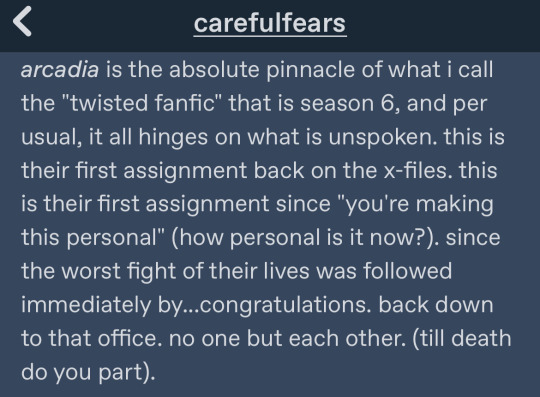
season six is very tropey, but most of it is also erased, they don't remember the events of dreamland or monday, triangle is a dream/the past. arcadia specifically, is taking a trope fandom usually makes fun or to bring two characters together, and uses it more like mulder & scully are working out some issues.
as kae says, mulder is peak annoying. almost insufferable. but it's these moments that tell us a lot. mulder says at the beginning that 'this isn't an x file.' he's not thrilled with the assignment, he's excited to get back to their work. scully disagrees, tells him 'it's unexplained,' and teases him. but it's tense. i think at other times it would have just been. funny. but he's making marriage jokes, 'not taking the case seriously,' and taking jabs at scully about 'fitting in here' — which is actually misunderstanding what it is that she really wants.
scully was also excited to get back to their work. she was just as bored without the x files, especially with the work they were forced to do. and maybe she did want to 'play house' but i think mulder ruined any fun she was having and her walls went up. so she started being annoying too lol
i love that this episode is tense, a little angsty. but their work partnership is still intact, even if a little strained. they go about their investigation in a fairly typical way, although mulder just tries to piss off the neighbors thinking this is simply human for most of it. i honestly love the way he tries to shake up the neighborhood. it's similar to mr. kline and is ultimately what got him & his wife killed. so he's on the right track (what a surprise). (and even when scully's right that it's an x file, i don't think she's right about anything else lol so classic.)
i always really liked @randomfoggytiger 's mulder analysis & this post lol, and i love the way kae connected the theme of this episode to a common theme running through the show.
i think fandom tends to view this through an msr lens, and not that isn't but it isn't the very in love & together phase of season seven episodes. it's them figuring out how to get there. not understanding what the other thinks or wants, what a relationship between them would like, or what it would mean for their work.
now for some scene specifics that i LOVE.
i love the way mulder reflects the man murdered in the beginning. mr. klein? is so fed up with the ccnrs & the uniformity. he's annoyed by win painting his mailbox. he's excited to get that weird lawn ornament. his wife is very accepting of his bothers, though she doesn't seem to care personally. it's just. it's very reflective of m+s through this episode.
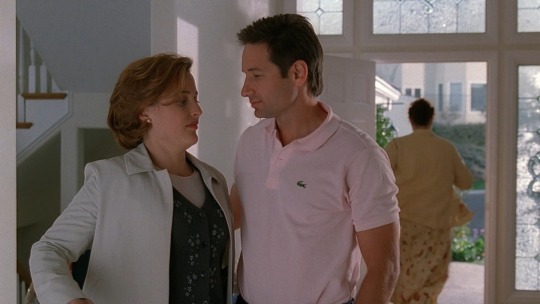
and THIS moment. the way scully puts her hands up to be like 'okay enough, back off.' it's so funny. like. mulder & scully are affectionate. but it's mostly gazing, lower back / arm touches, hand holding...hugging is rare, it's reserved for deeply emotional & vulnerable moments. not just because. but here they have to. and i think that's uncomfortable for them even as they're soaking it up.
then after they're all moved in, as soon as they're alone:
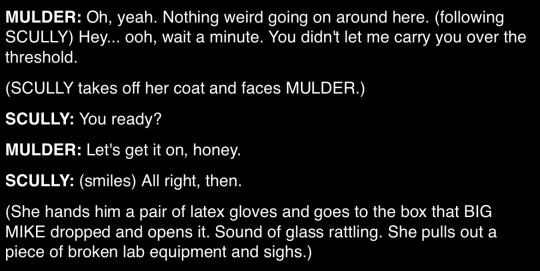
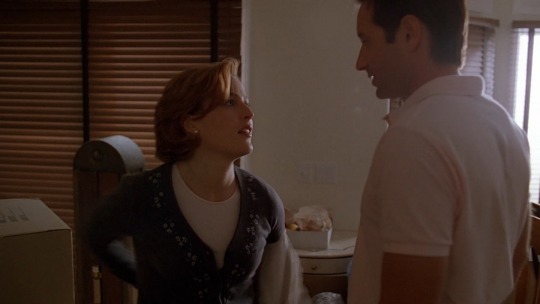
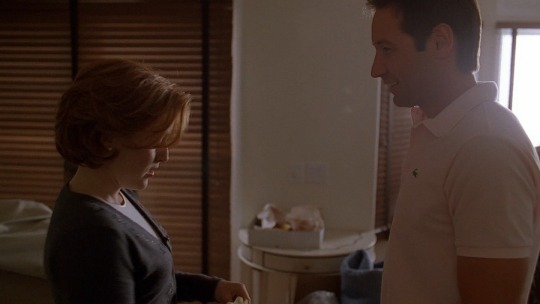
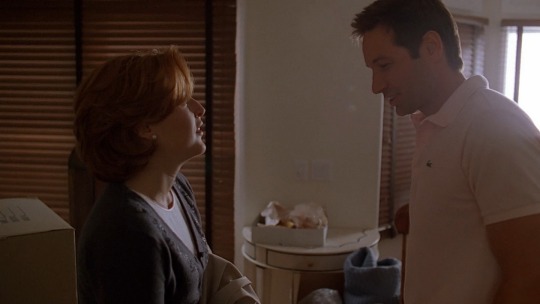

this part says to me they were excited (personally) for this case, at the very beginning they're having a great time. i think scully is even amused by his "honeymoon" tape joke & his (bad) sandwich joke, i love when she throws the gloves at him lol
it's also just funny to me to see how they play these roles. like they just aren't good at it, they're not very subtle. but these people don't know them so it works. the neighbors are overly friendly and overly concerned, and mulder & scully are trying to find out why but they're not the easiest group to crack. despite the intense fear & worry cami clearly feels.
i also think this episode sets mulder up as a house husband, which is soooo fitting. i actually think this is closer to what he talks about in home than he's willing to think about. it's got a small town feel, close knit community, safety. it's just ... extremely suburban with too many rules. and he likes breaking rules atp more than following them. and this time, it actually is his job to break them. this was a perfect case for mulder, with or without the monster angle.
i think i've said this before in other season six talk, but from the moment i saw someone talk about how m+s don't have a blueprint for their relationship, it's the lens i see season six through completely. they start trying to communicate more clearly, not well but they're getting closer. here they're in a very particular limbo (especially after two fathers/one son), where neither of them can deny their feelings (but scully's are "the problem"), and their trust & partnership has been tested. agua mala was about reaffirming their trust & partnership and some off the clock bonding. arcadia is their first on the clock test, which undercover as a married couple is probably also kind of a nightmare for them given their circumstances lol
BUT GENUINELY they were both enjoying it at the beginning, and they have different moments throughout where one is and the other isn't.
one particular thing i love is the way scully puts up boundaries. because i think after a few jokes, and mulder telling her she fits in perfectly...she feels she has to. mulder isn't ready and he doesn't understand, it makes her retreat.
like after mulder sees the monster...scully asks him if he cares to hear what she thinks. he pauses, looking at her, before he tells her "always." they really getting back into step with each other but after hurt & confusion, all the tension...it takes time. they need to hit certain beats to get there and i think this episode does that very well. the moment when mulder thinks scully's been attacked by the creature, that he's about to find her eviscerated. it before that when he's searching the hole they dug, and she comes out speaking quietly & gently, telling him to come in and "call it a night." this is so domestic and partnerly it kinda kills me. he really does always listen. scully is the only person who can pull him back, keep him grounded. and she always give him the space to explore his theories and she investigates them seriously.
the way mulder is terrified when he sees the door and walks into the house. it's every time he's almost lost her flashing before his eyes again, not that long after tithonus. after he could have died in agua mala, before they even patched things up. to me, agua mala, arcadia & alpha build up to milagro, open the door for the unnatural & field trip. it's the perfect set up for biogenesis, the sixth extinction and amor fati. the final hurdle mulder needed. all of these things slowly build scully's confidence back up so that she's ready too. even though she still won't make the first move.
#arcadia#edierone#the x files#txf meta#i don't think this is my best#had a weirdly hard time writing about even though i really do love it#mulder and scully#txf s6
38 notes
·
View notes